The best Elden Ring weapons and their stats explained
The main Elden Ring weapon types and details explained
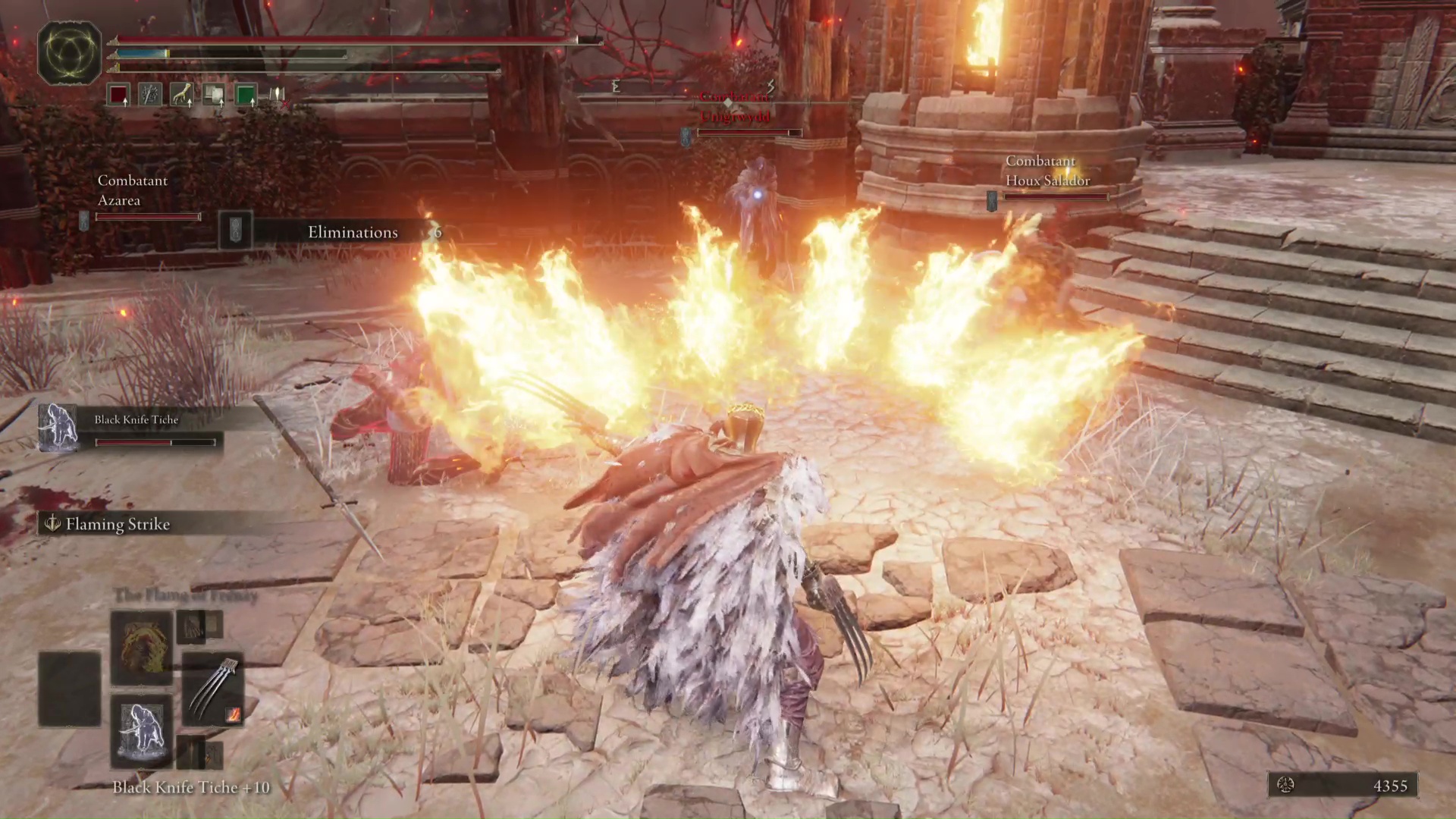
The best weapons in Elden Ring are generally those with really good scaling - meaning that the multiplier to damage or effectiveness they get based on your own stats is as high as possible. However, that's certainly not the only factor in consideration - attack patterns, range, special abilities and more besides mean that filtering the vast armoury of Elden Ring for a powerful arsenal is practically a full time job, especially once you're past the initial best Elden Ring early game weapons and want something a little more potent (though spoilers - there is some overlap).
With all that in mind, we'll cover the best weapons in Elden Ring below, as well as provide a comprehensive explanation of all the weapon types you can find so you know what you're dealing with when you find something new.
The best weapons in Elden Ring
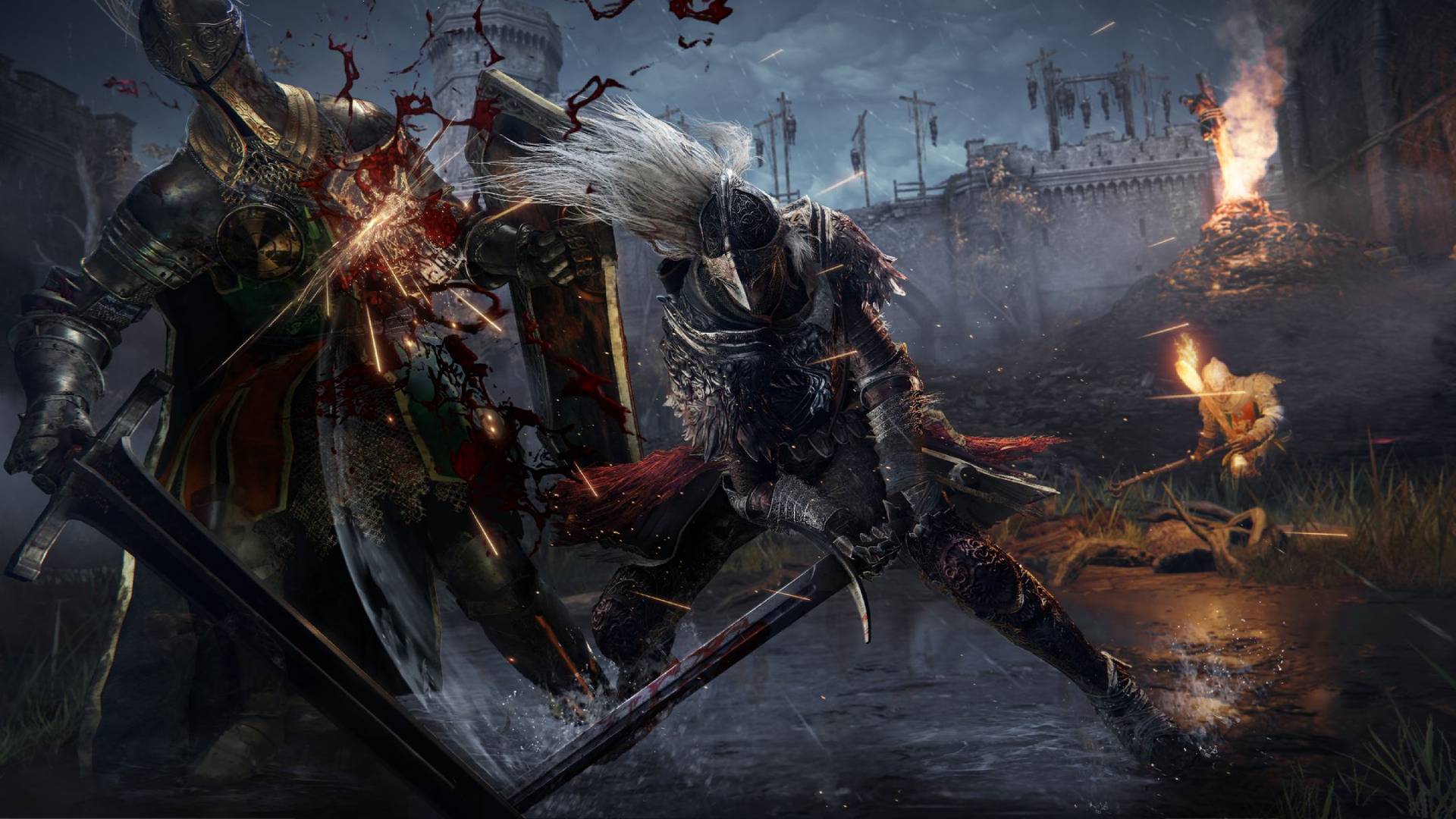
With the sheer amount of build variety and weapons available in Elden Ring, a skilled player can make almost any weapon deadly. With that said, there are some weapons that stand a cut above the rest across the early and late stages of the game. Here are a few of the best Elden Ring weapons that you should grab and level up as soon as you can, with options for every kind of player and build. Keep in mind that what works for one kind of character won't work for every kind of character.
- Lordsworn's Straight Sword: A solid and versatile Straight Sword appropriate for a range of builds. Great for players learning the ropes of Elden Ring or those looking for something disposably before they get their ideal weapon. Get it early on by defeating the Noble Knight at the Gatefront Ruins.
- Blasphemous Blade: This Greatsword can be acquired from the Remembrance of the Blasphemous that you get for defeating Rykard in Volcano Manor. Each kill you get while you have this weapon equipped (not even in your hands) heals you a little bit, which is incredibly useful. It deals high damage too but will require a bit of Faith as well as Strength and Dexterity to wield.
- Heavy Zweihander: Players that want a colossal weapon for slow but high damage attacks should go for the Zweihander early on. You can get it from the Isolated Merchant in the Weeping Peninsula for 3500 Runes.
- Bloodhound's Fang: A strong Curved Greatsword that can be acquired by defeating the Bloodhound Knight in the evergaol south of Agheel Lake in Limgrave. This boss is quite tough, but the reward is worth it if you're after a heavier weapon that favors Dexterity.
- Uchigatana: Arguably one of the best starting weapons in the game thanks to it being part of the Samurai classes' kit, the Uchigatana is a fantastic sword with good versatility thanks to its balanced damage scaling. Its ability to inflict decent bleed damage also makes it very deadly.
- Moonveil: The next step up from the Uchigatana is the Moonveil Katana. This sword deals a portion of its damage as Magic damage and has C-tier Intelligence scaling, making it a superb melee weapon for any sorcery builds. The Transient Moonlight skill gives the sword ranged attacks, and it has a slightly better bleed effect compared to the Uchigatana. Although, you'll have to defeat the Magma Wyrm boss in Caelid's Gael Tunnel to get it.
- Morning Star: You can find this simple melee weapon very easily in a broken wagon chest in the Weeping Peninsula area south of Limgrave. The Morning Star deals moderate Strike damage, balanced Strength and Dexterity scaling, very low Attribute requirements, and deals bleed damage. With all this, you've got a versatile weapon for the early game that's very easy to use for magic builds that generally have low Strength and Dexterity.
- Ghiza's Wheel: By the time you get this weapon from the invader Inquisitor Ghiza in Volcano Manor, you should be able to upgrade it several times and enjoy ripping enemies to shreds with it's unique Spinning Wheel skill, which causes massive bleed damage.
- Meteorite Staff: This staff boasts an S-tier Intelligence damage scaling, meaning spells will deal massive damage and it boosts the damage of gravity sorceries, such as Rock Sling. However, you need to grab this staff early on, as it can't be upgraded and will eventually get outclassed by other staves. A good substitute would be the Demi-Human Queen's Staff since it can be upgraded and will therefore last longer.
- Lusat's Glintstone Staff: This staff is very powerful but is definitely one for the endgame, so don't expect to find it for many, many hours. At the cost of additional FP, this staff boosts the power of all sorceries and comes with B-tier Intelligence damage scaling. However, its minimum Intelligence Attribute requirement of 52 means you'll have to level up a lot to use it!
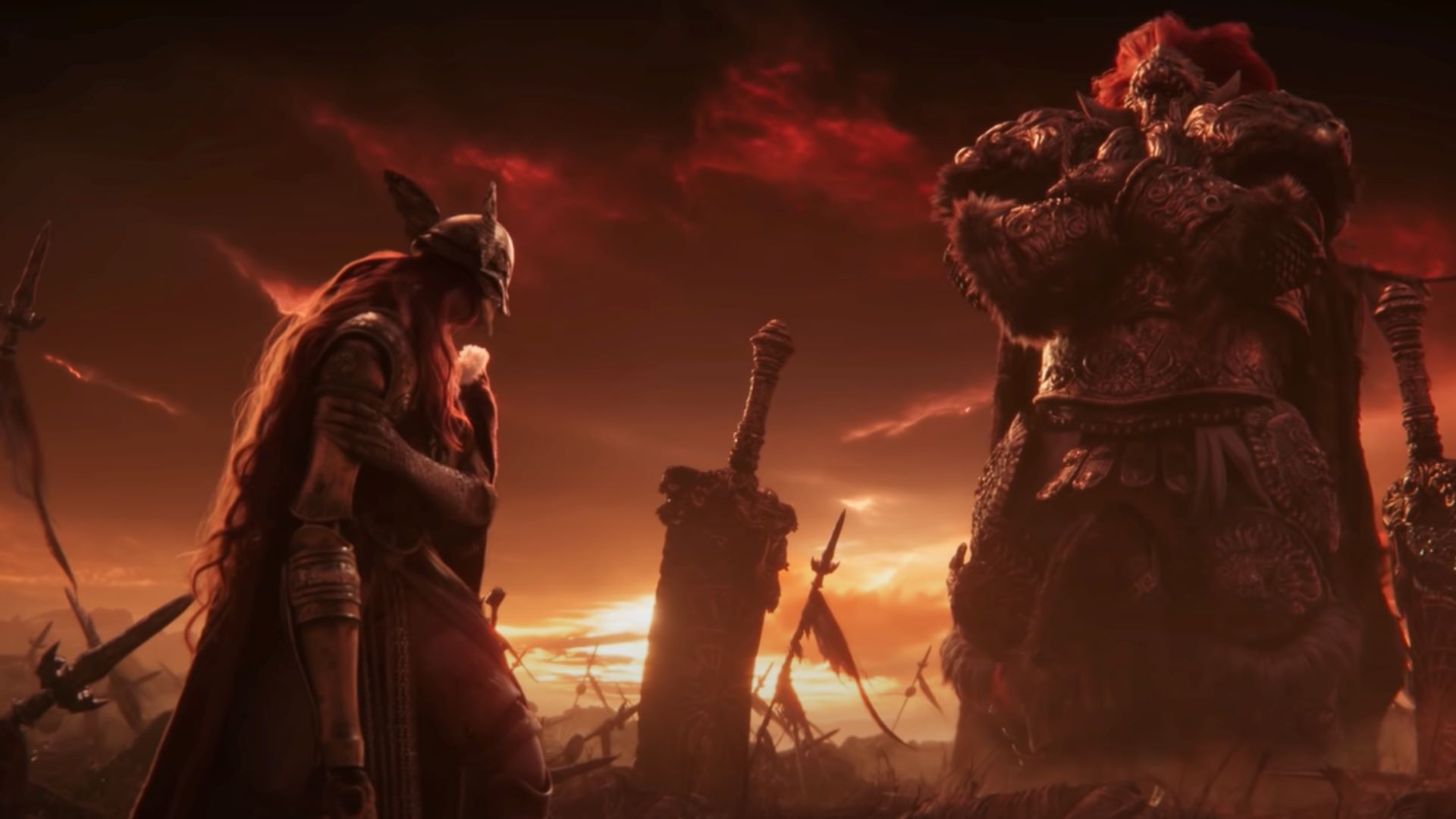
Want to put these weapons into the context of a true build? Find the Elden Ring best builds or best Elden Ring PvP builds here!
While these weapons are powerful and useful, most of them are either swords or Glintstone Staffs and bleed damage is a common theme with a lot of them. However, we still think it's important to know about how all the weapon types in Elden Ring work, so that you know what sorts of playstyles and builds you can pursue.
Generally, if you're using a heavier weapon, you're trading higher damage for a lower attack speed. If your fighting style relies on combos of rapid strikes, a fast weapon such as a curved sword will suit you well, but if you prefer dealing a devastating blow at just the right moment, a great hammer or colossal sword is for you. Things get more complicated if you've got to factor in any magic abilities you have too.
All weapon types in Elden Ring
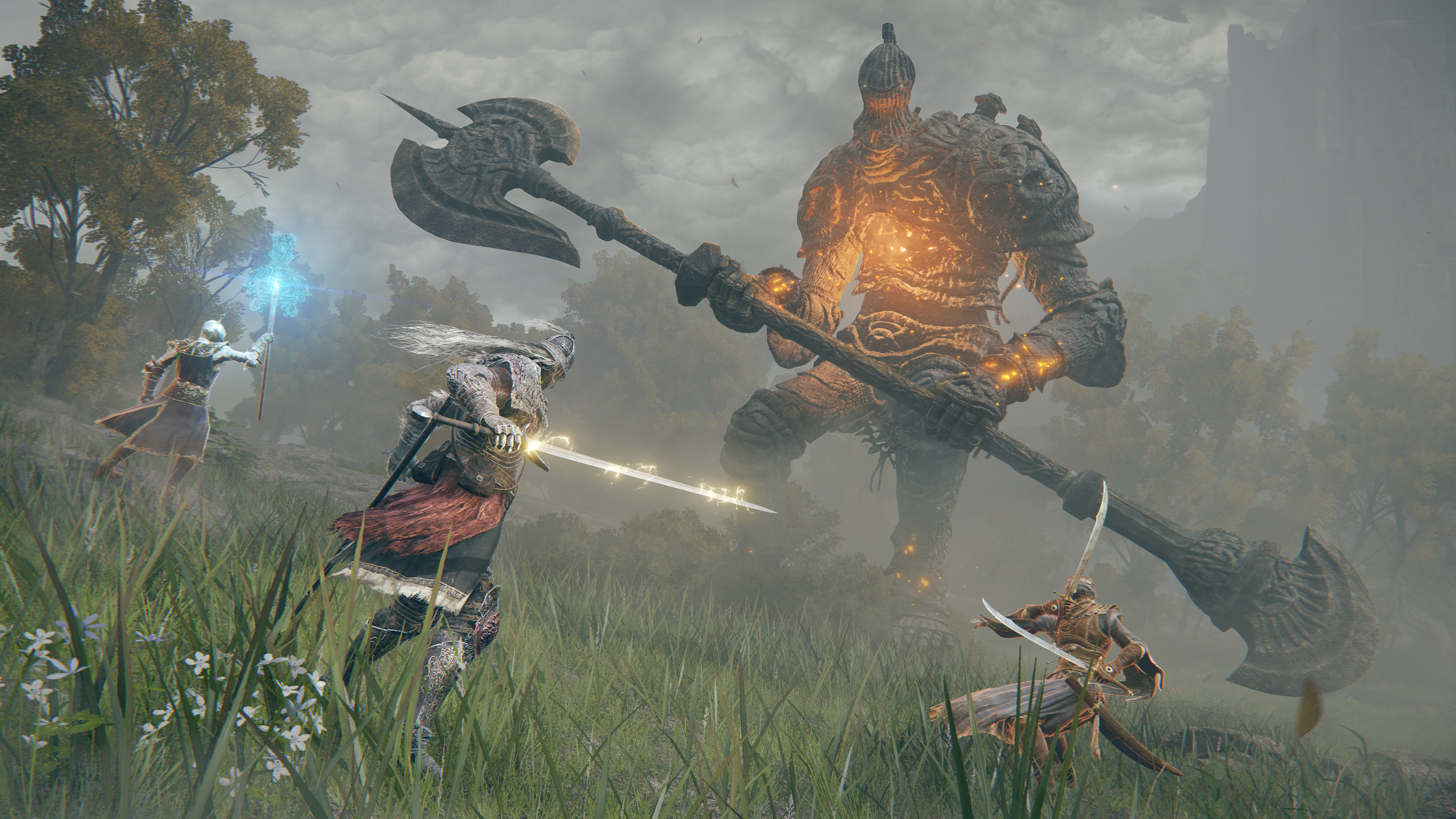
Below we've listed all the weapon types in Elden Ring and what you need to know about them. You can either scroll down, or use the list below to quick-travel down to the relevant section!
- Daggers
- Straight Swords
- Greatswords
- Colossal Swords
- Thrusting Swords
- Curved Swords
- Katanas
- Twinblades
- Axes
- Flails
- Hammers
- Colossal Weapons
- Spears
- Halberds
- Reapers
- Whips
- Fists and Claws
- Bows
- Crossbows and Ballistas
- Glintstone Staves
- Sacred Seals
- Shields
Daggers
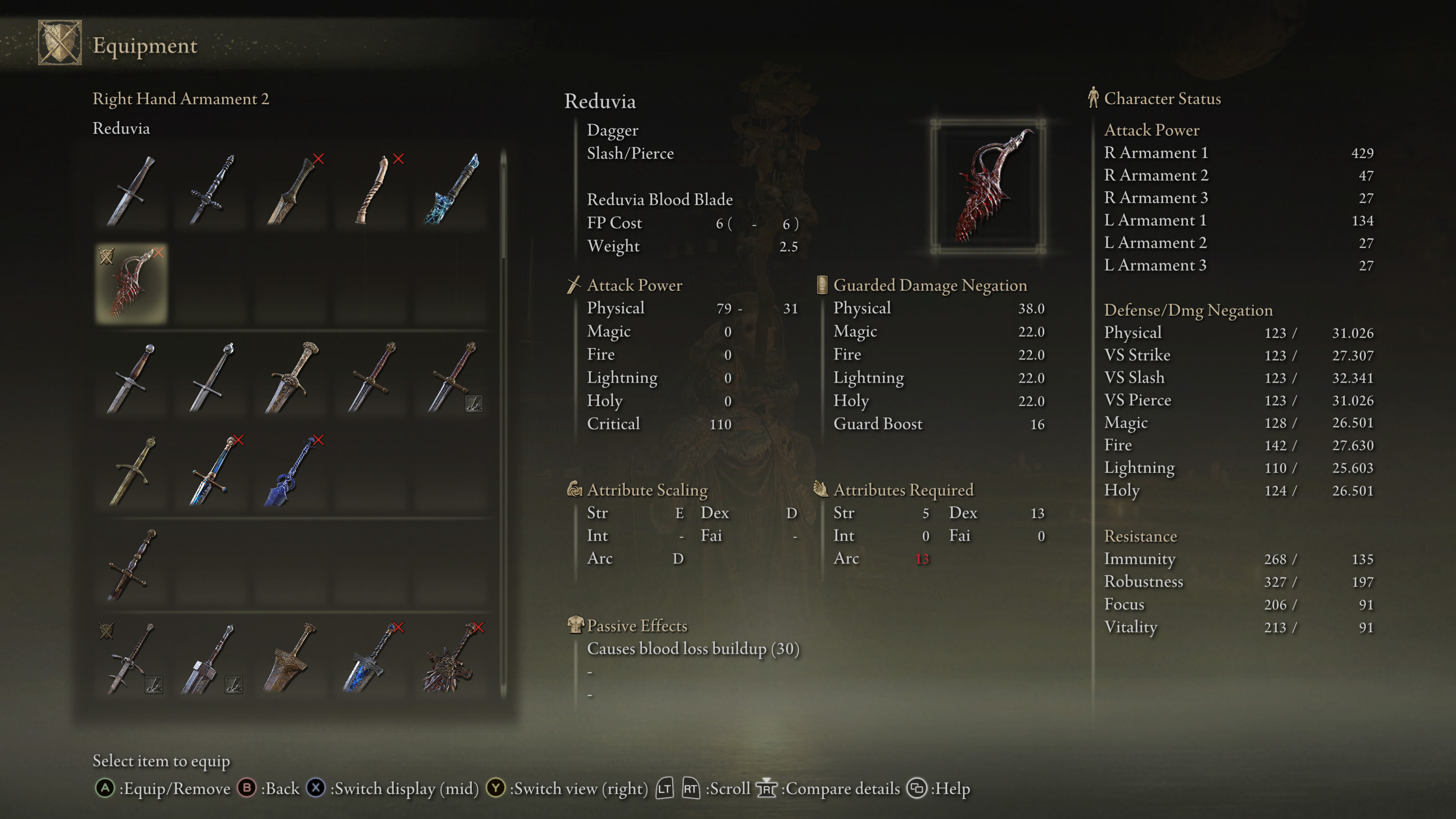
As you'd expect daggers are fast, short range weapons that make up for low damage with the ability to land a torrent of blows quickly. Because of that, they're maybe not the best starter weapons, relying on a good technical skill to land backstabs and ripostes after a successful parry to take advantage of a high critical damage. They're mostly Dexterity-scaling weapons that deal a mix of Slash and Pierce damage, making them highly effective against enemies with minimal armor, if any. Some daggers come with extra passive effects, such as the Reduvia with its solid bleed damage bonus. And if you're not a fan of shields, you can even get a parrying dagger!
Straight Swords
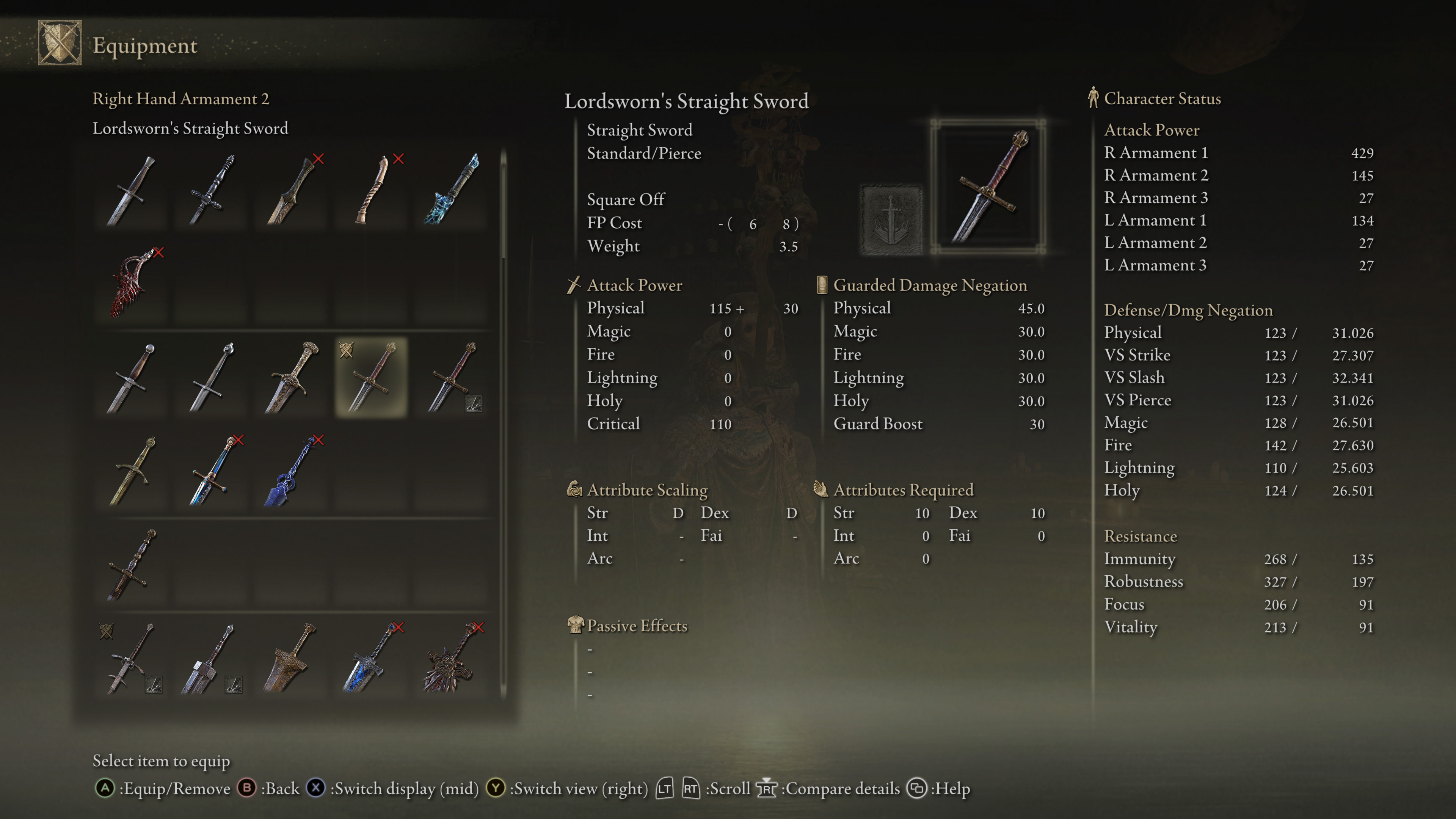
This basic Elden Ring sword type is a solid beginner choice due to its good damage and moderate attacking speed. These swords generally have balanced Strength and Dexterity damage scaling, making them great for varied builds that employ a mix of magic, melee, and range. Straight Swords are simple to use but can be improved and specialized through being able to use almost every Ash of War, allowing you to add a range of extra skills and damage affinities to affect the scaling and bulk out the otherwise plain offensive options. For a classic melee combo, you'll want to pair a Straight Sword with a shield, and if you're looking to start out with one of these melee weapons, choose the Vagabond or Confessor starting classes.
Greatswords
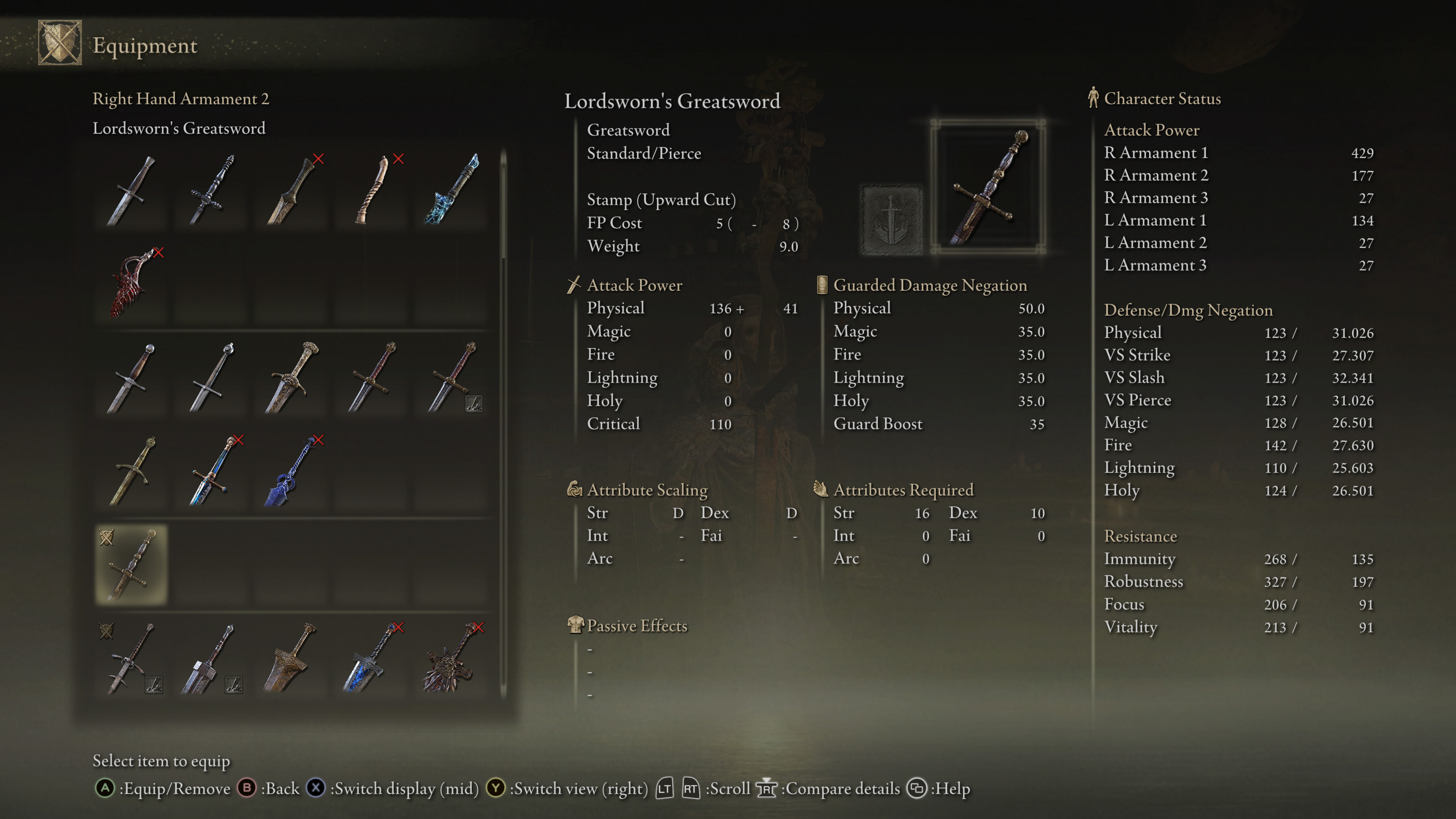
These are, as the name suggests, bigger swords. The trade off here is obviously sacrificing mobility and speed for heavier, more damaging hits. Although, Greatswords still manage to maintain a bit of versatility when it comes to Ashes of War and can be enhanced nicely with the right ones. Since Greatswords also tend to favor Strength damage scaling, the Heavy Affinity can also be a good to equip. Overall, these swords act as a midpoint between the small, fast, but low-damage Straight Swords and the huge, powerful, but slow Colossal Swords.
Colossal Swords
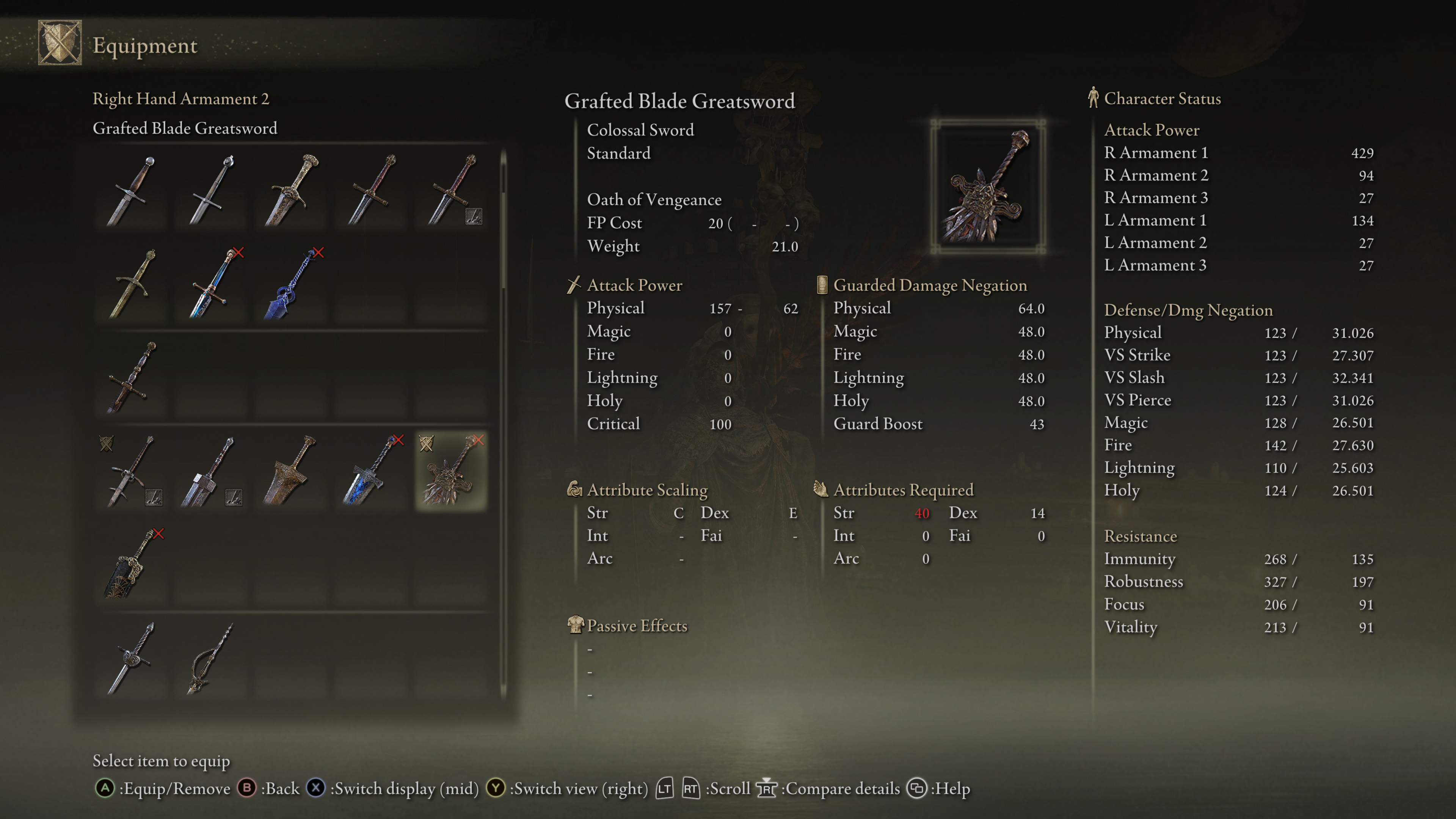
If you thought Greatswords were big, wait until you see these! As the word 'colossal' implies, these swords are pretty much as big as you are, if not bigger. They are phenomenally heavy and are very slow to attack with, but the trade off is that they deal huge damage with each hit. Successive jumping attacks and charged heavy attacks can prove devastating, killing weaker foes in just a few hits, or staggering even the largest bosses. However, you'll need to meet the high Strength Attribute requirements to wield these effectively and attack timing is key. Some bosses will drop these colossal weapons, but you can buy the Heavy Zweihander quite early on.
Thrusting Swords
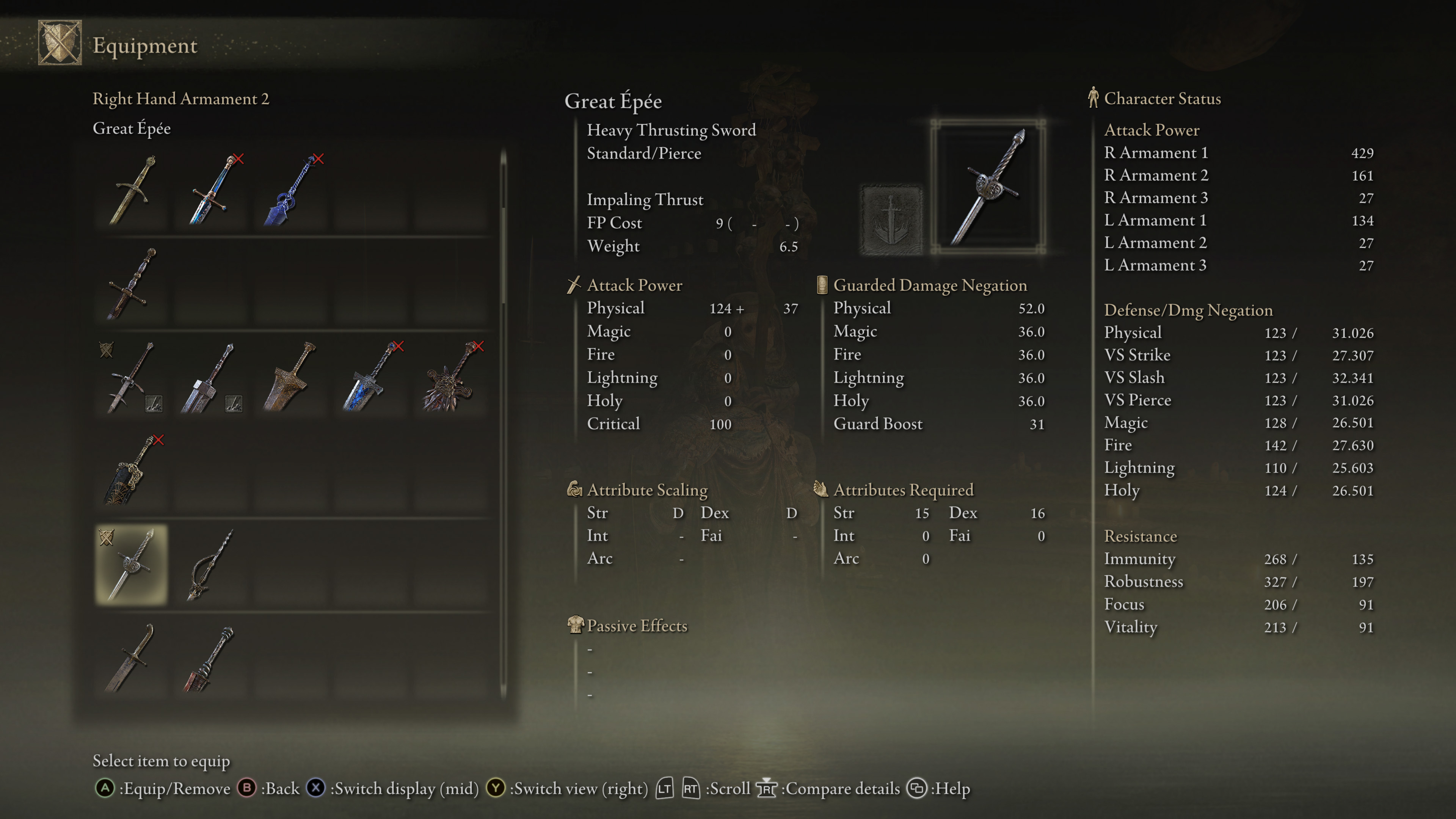
Thrusting Swords are midway between Straight Swords and Spears - they have the basic short-range slashing of swords, with the longer range piercing abilities of spears, but don't excel in either. You'll need to spend your Runes on upgrading your Dexterity if you are to succeed with Thrusting Swords as most of them have Dexterity-based damage scaling. Players looking for a solid Thrusting Sword could pick up the Estoc, which the Prisoner class starts with.
Heavy Thrusting Swords are also in Elden Ring and they require a bit of Strength to wield effectively. While they are functionally the same as regular Thrusting Swords, heavy variants are going to be a bit slower to attack with, but will hit harder with each attack. You'll also have to meet higher Strength Attribute requirements to use them, and they offer more balanced scaling that uses both Strength and Dexterity.
Curved Swords
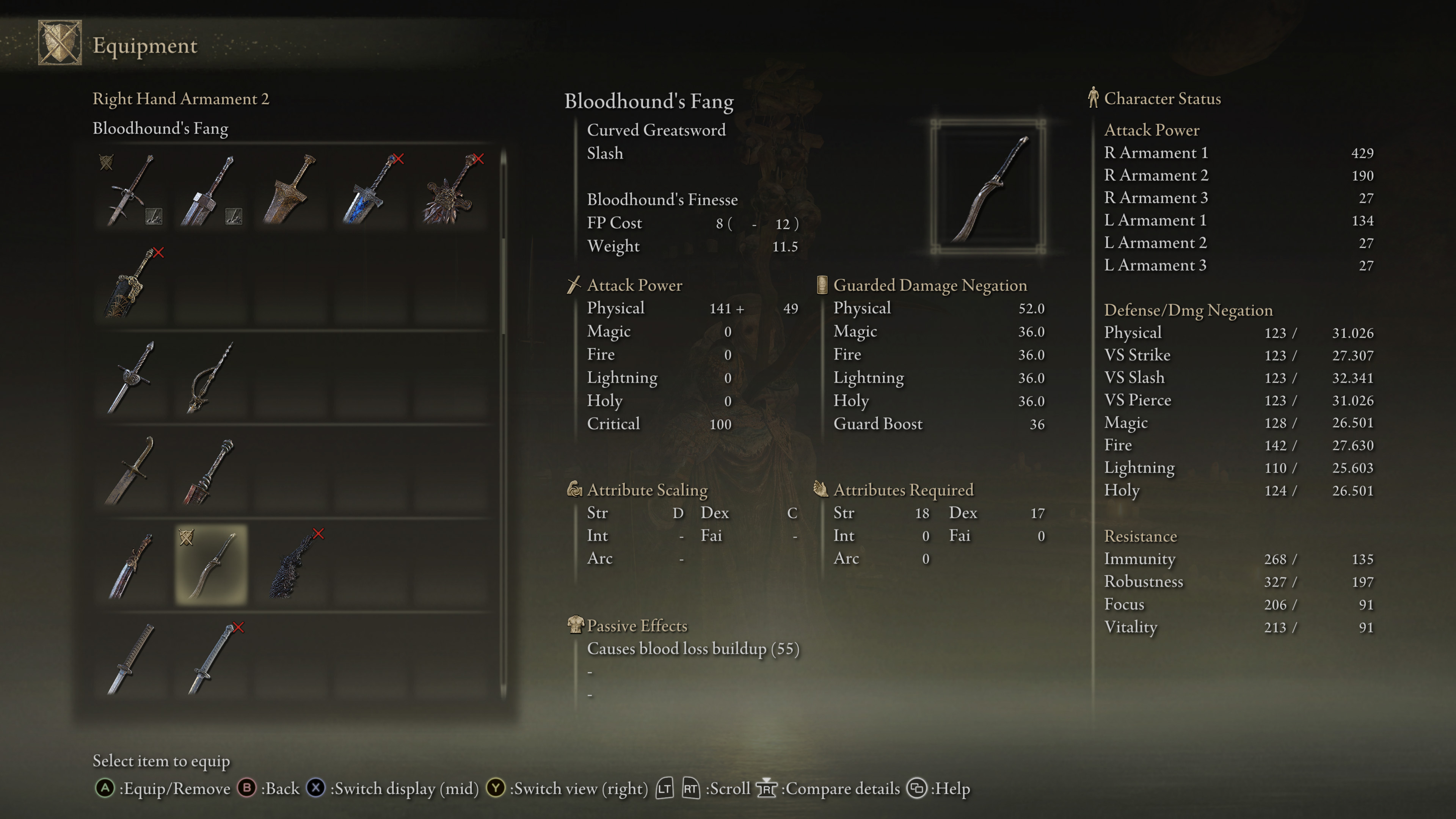
Curved Swords in Elden Ring focus on dealing moderate Slash damage through rapid and varied attacks. The trade off is that more heavily armored enemies will be harder to dent with only Slash damage, although a good Ash of War should be able to help you out. Curved Swords have generally quite balanced damage scaling between Strength and Dexterity, but some favor Dexterity a little more. On the other hand, Curved Greatswords can either be balanced or favor Strength or Dexterity. They also deal much more damage, but at the cost of slower attacks. If you're looking to get a Curved Sword of some kind early on, your best route is to start as the Warrior class to get two Scimitars.
Katanas
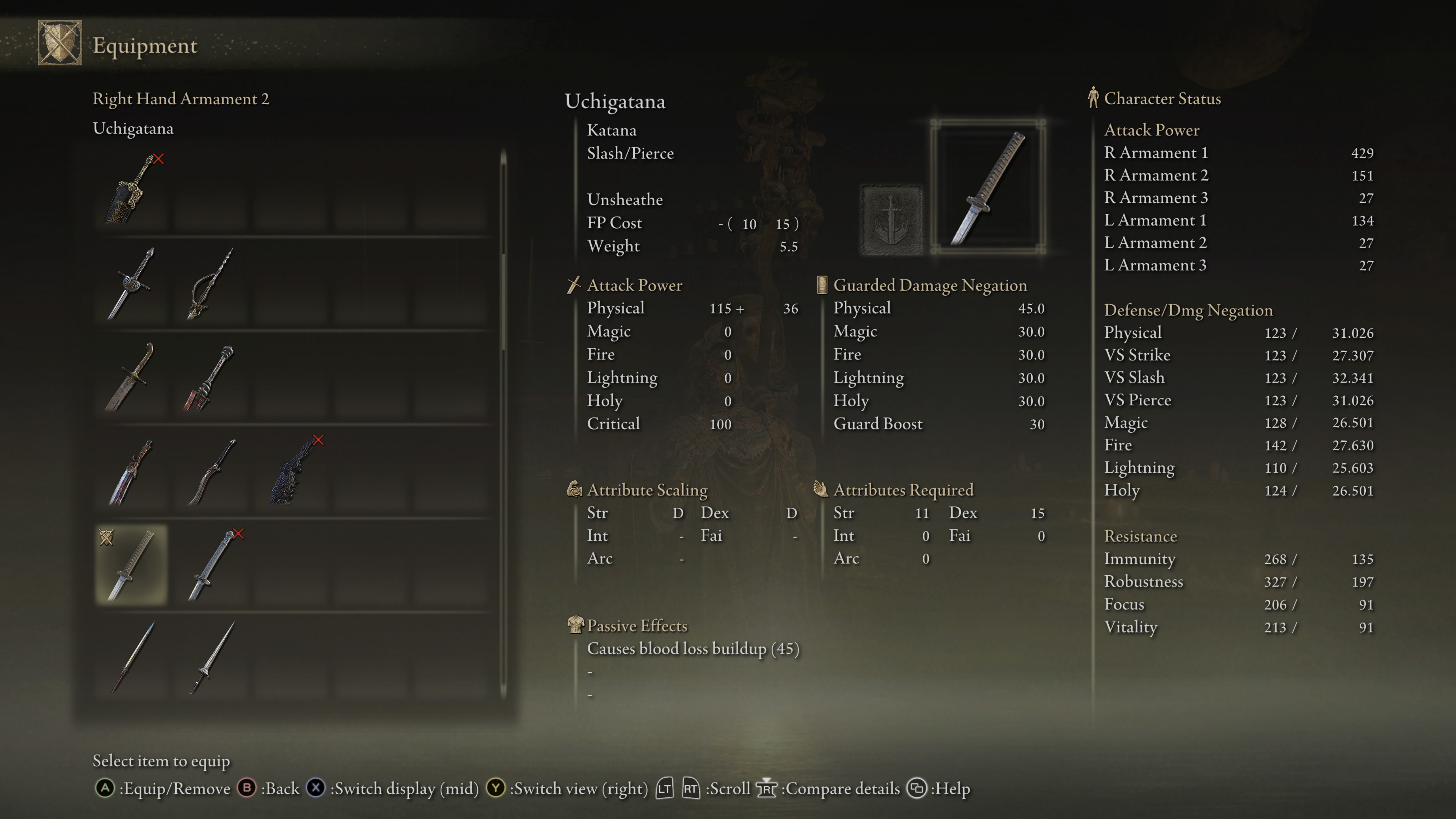
Similar to Curved Swords, the Katana is another specialized sword type in Elden Ring that focuses on Slash damage, but Katanas can also deal Pierce damage. They also have the added bonus of causing extra damage through the blood loss effect, making them great for rapid combos leading to high damage through bleeding. The Uchigatana is a great Katana option that can be found early on, either by choosing the Samurai class or by finding it in the Deathtouched Catacombs in Limgrave.
Twinblades
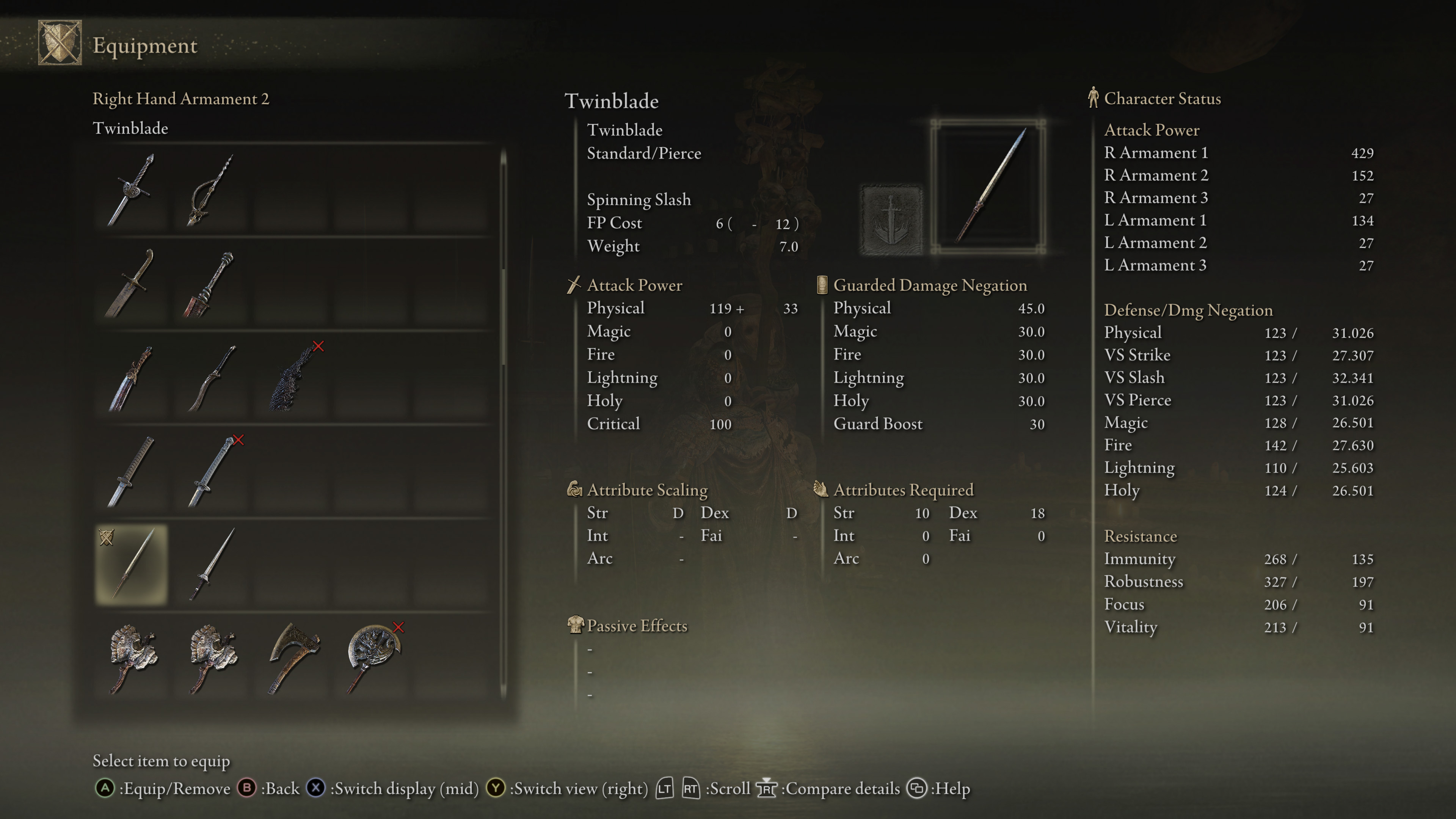
This is an interesting weapon type that's basically a double-bladed sword. It can be used one-handed as a more traditional option, but obviously is better using both hands to unleash a range of twirling attack that can hit multiple enemies in a wide area. You can get the Twinblade in a chest withing the Dragon-Burnt Ruins in Limgrave, although other twinblades are available, such as the Twinned Knight Swords. Both come equipped with the Spinning Slash skill to inflict heavier, spinning slash damage. Like basic swords, they scale with Strength and Dexterity.
Axes
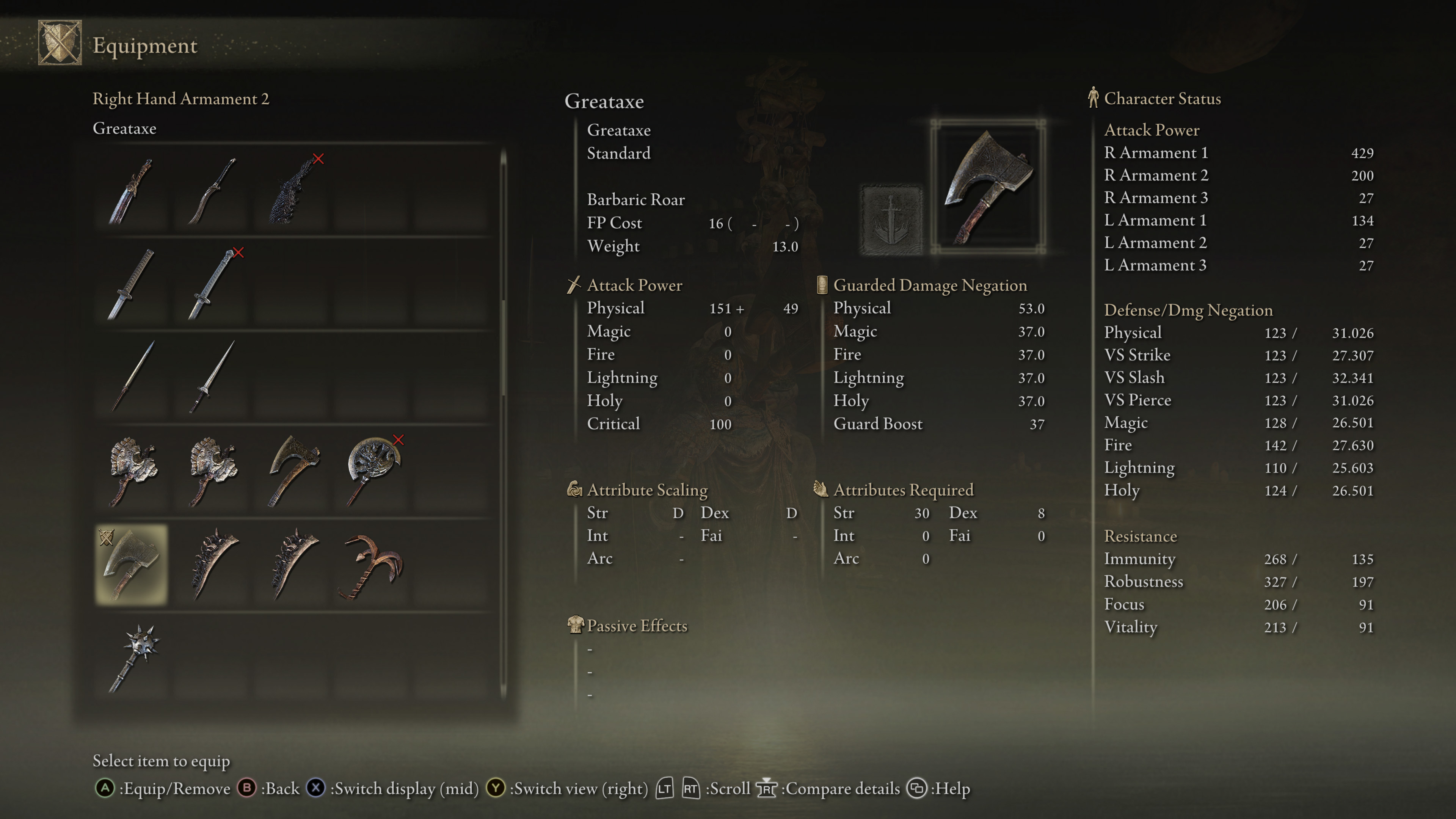
Axes and Greataxes provide a lot of heavy attack options and usually inflict a lot of damage. The Hero class starts with a Battle Axe which features the Wild Strikes skill that lets you attack as long as you hold the button down or until you run out of FP, the stat that powers magic and abilities. You can also add a range of different skills using the Ashes of War. Axes and Greataxes deal Standard damage and can have quite balanced strength and dexterity scaling (although a fair few tend to favor strength), so they're quite versatile.
Flails
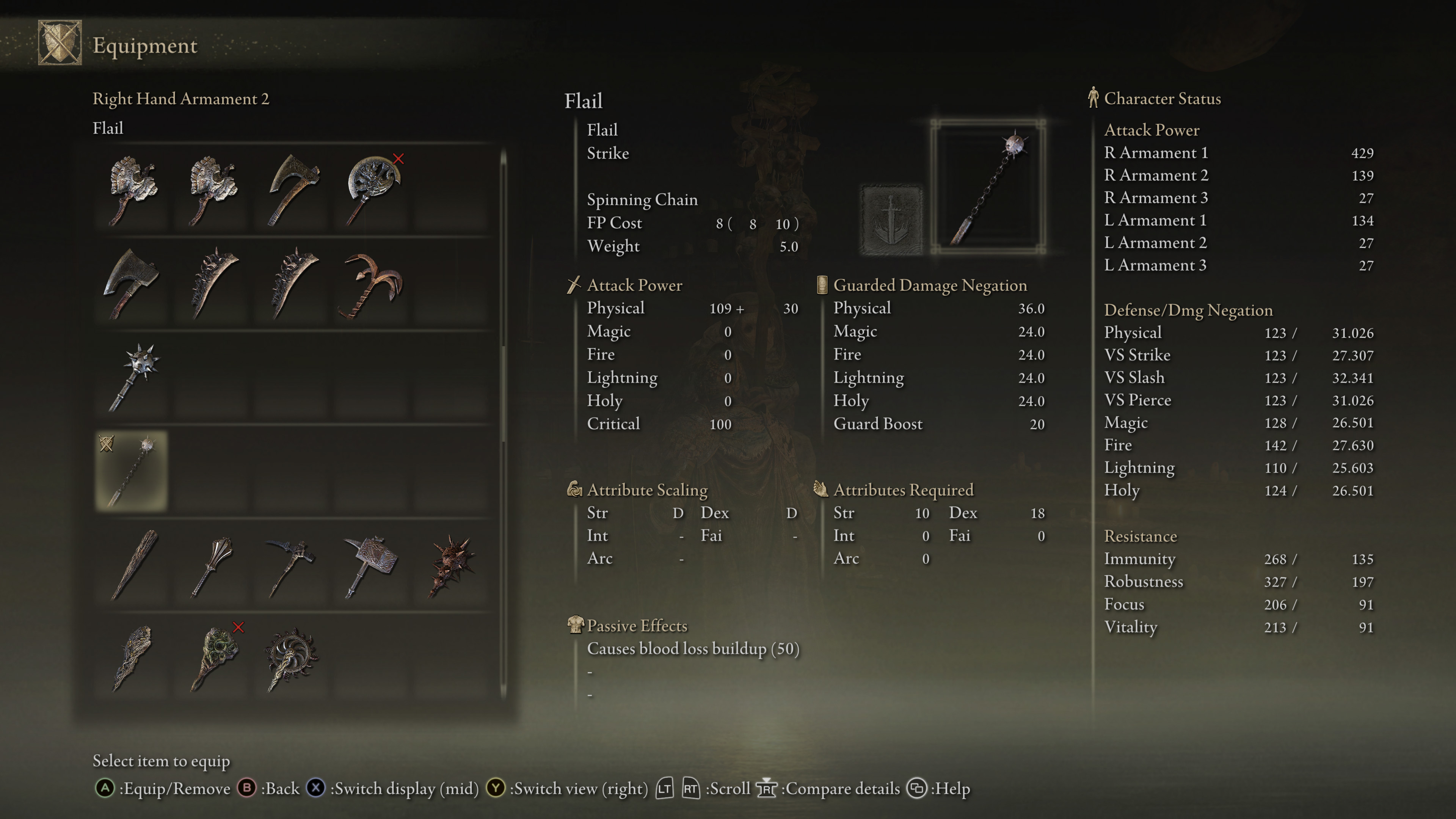
There are very few Flail weapons in Elden Ring and most of them have higher Dexterity damage scaling and deal Strike damage. They have a slightly longer reach, and some of them deal good bleed damage, but otherwise, Flails are a bit unremarkable. If you want to try one out, you can very easily get a Flail from one of the wagon in the Gatefront Ruins.
Hammers
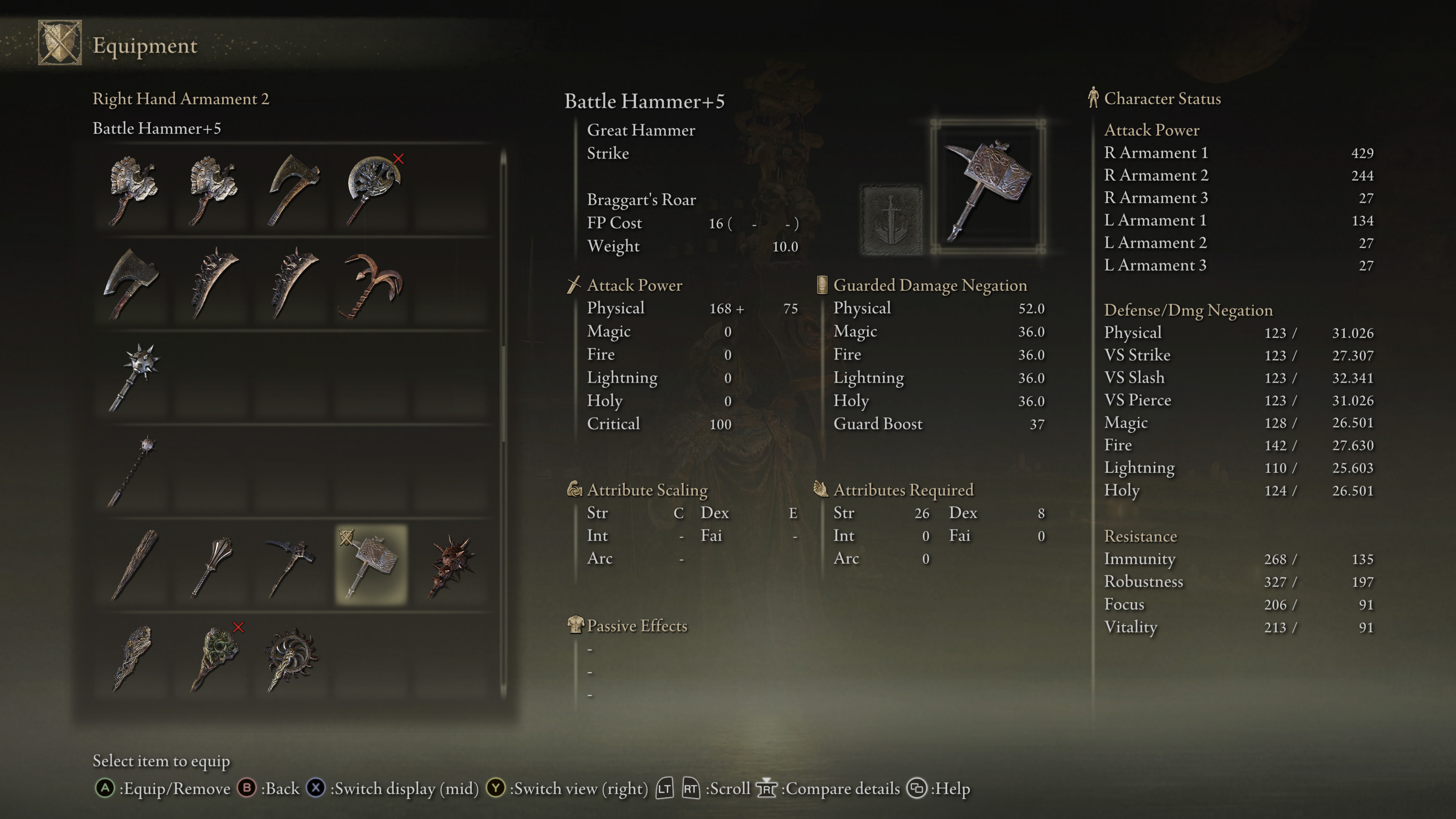
As you'd expect, hammer-type weapons are slow, heavy hitting weapons that scale with strength. Great hammers also exist and, unsurprisingly, they're much bigger than regular hammers, dealing significant damage but with a far slower attack speed. Hammers also deal Strike damage, which means they're effective against armored foes and those with rock-hard skin. You'll find they're really effective against the miners with rock-like skin found in tunnels and mines.
If you're looking for a solid early-game hammer weapon, the Morning Star mace is a solid option for any build. You can also get the Battle Hammer from the Grave Warden Duelist in the Murkwater Catacombs of Limgrave, but it requires at least 26 Strength to use well.
Colossal Weapons
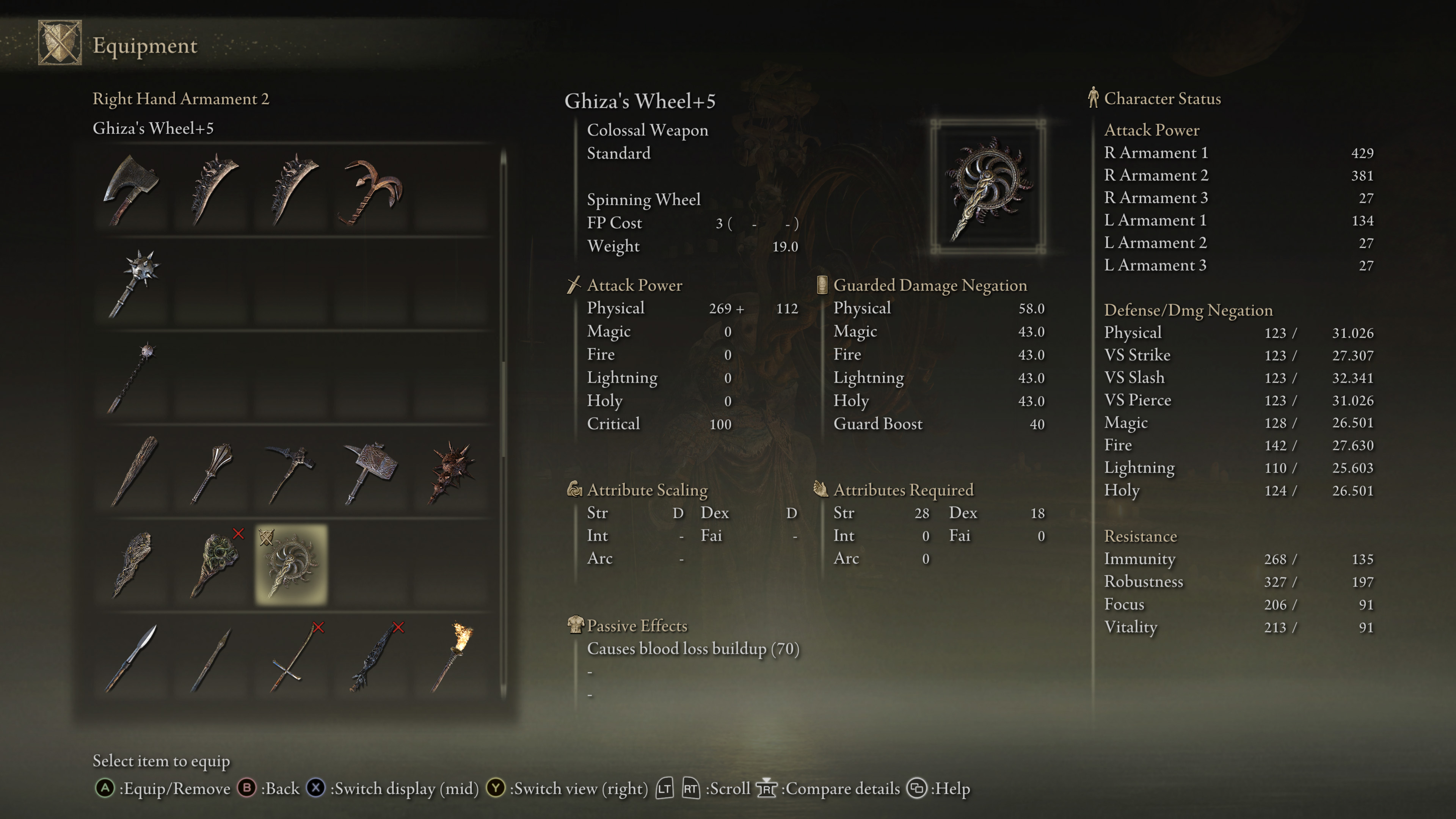
This Elden Ring weapon category is a bit of a strange one as the only thing tying these weapons together is that they are absolutely massive. Since Colossal Swords get their own category, you'll find mostly, non-sword weapons that deal other types of physical damage. The Greatclub is a huge bludgeoning weapon that scales well with strength and deals Strike damage. However, you'll also find the Ghiza's Wheel special weapon in this category - a buzzsaw on a stick reminiscent of the Whirligig Saw from Bloodborne that has it's own Spinning Wheel skill and can deal massive blood loss damage.
Spears
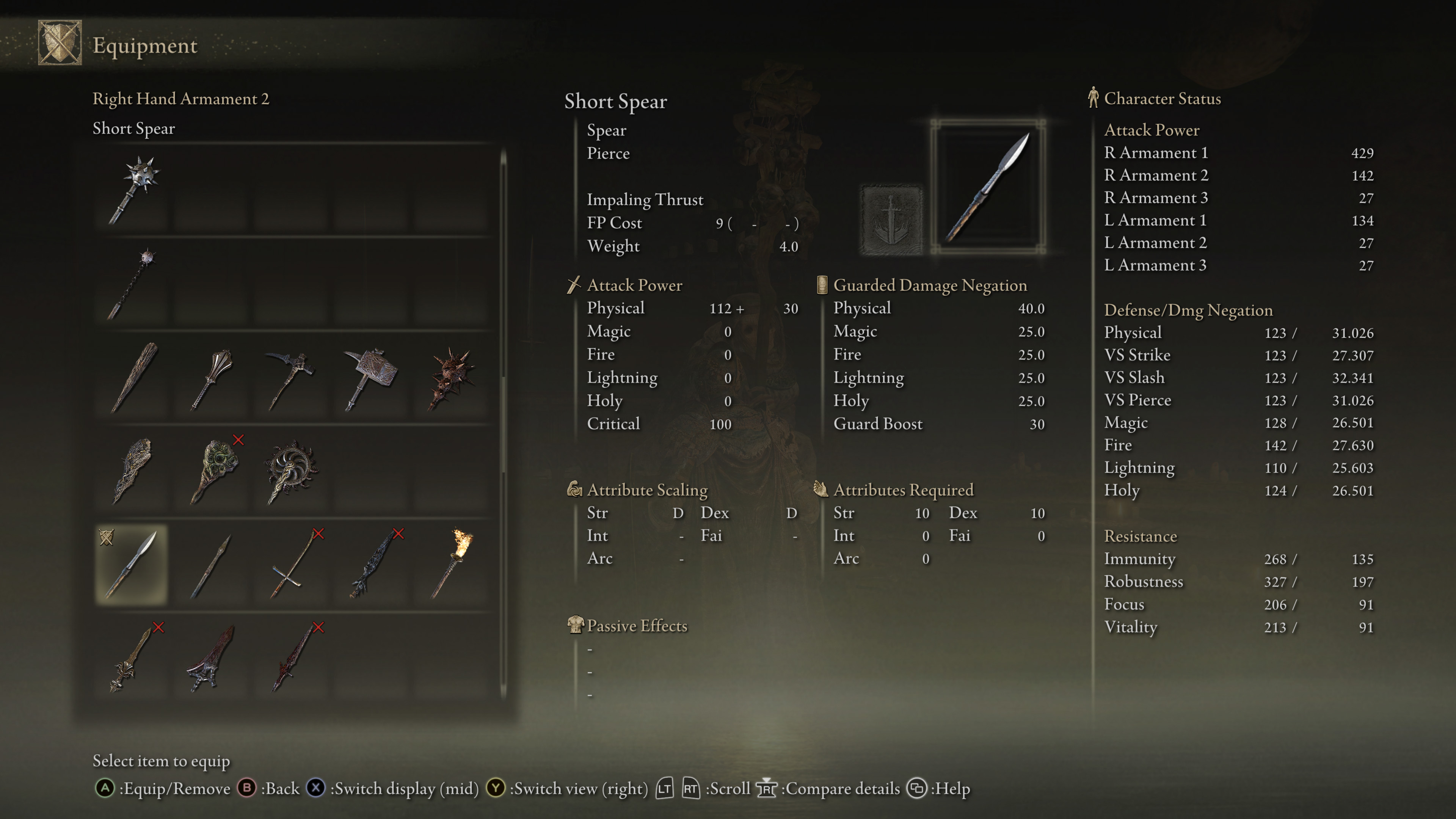
The biggest advantage to a spear or great spear weapon is the extra range it gives you compared to other melee weapons. Spears also deal Pierce damage, meaning they're effective against most enemy types, particularly those with light or medium armor. This weapon type's scaling tends to vary from being quite balanced between Strength and Dexterity, to high Dexterity.
Halberds
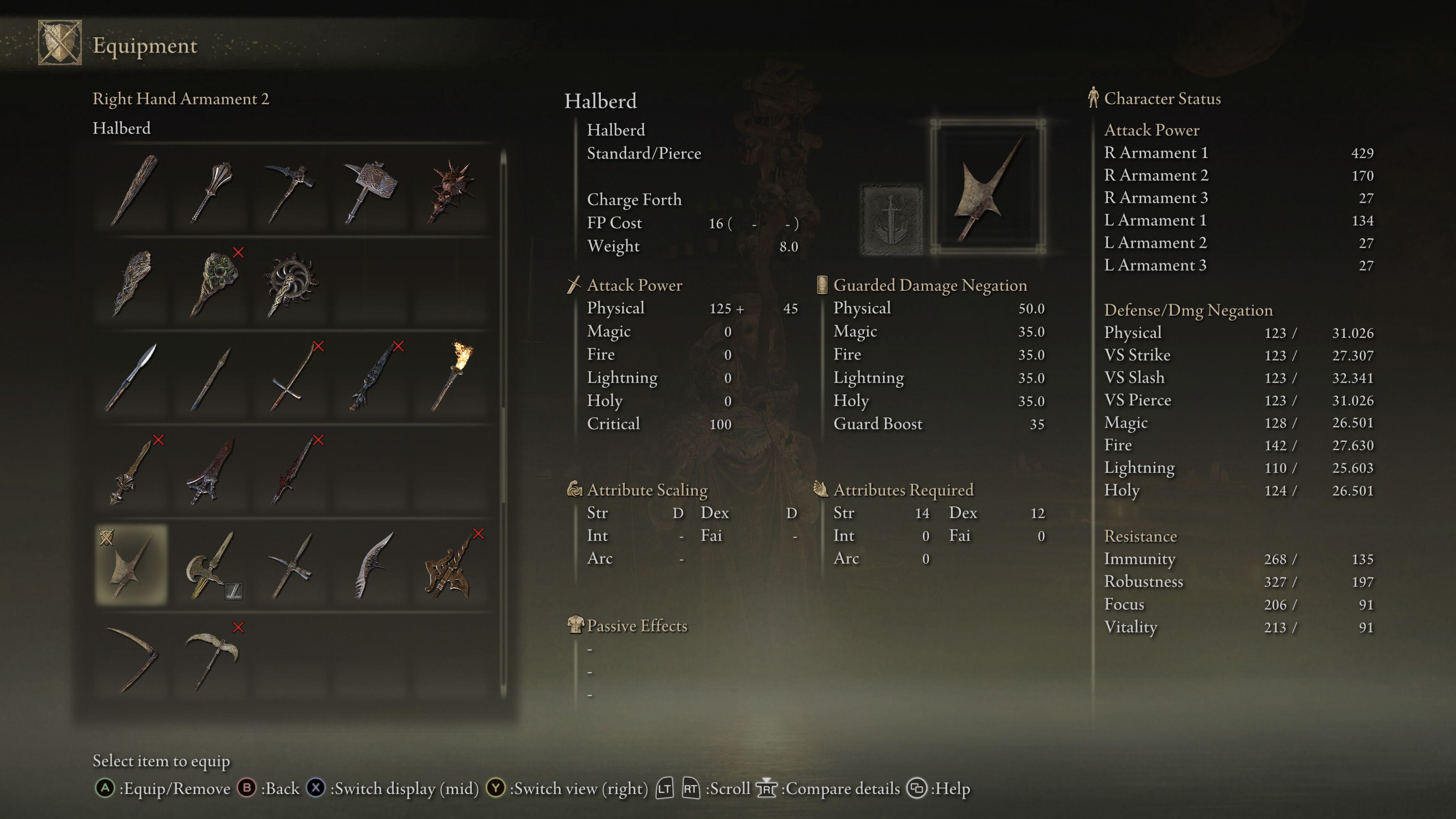
Using a Halberd in Elden Ring means you're combining the precise piercing attacks and range of a spear with the wider swings of a Straight Sword. Different Halberds lean into these attack styles more than others, so some will have higher Dexterity damage scaling, some will have higher Strength scaling, and others will have scaling that's more balanced between those Attributes. The Vagabond class starts with a basic Halberd if you want to try one out as early as possible.
Reapers
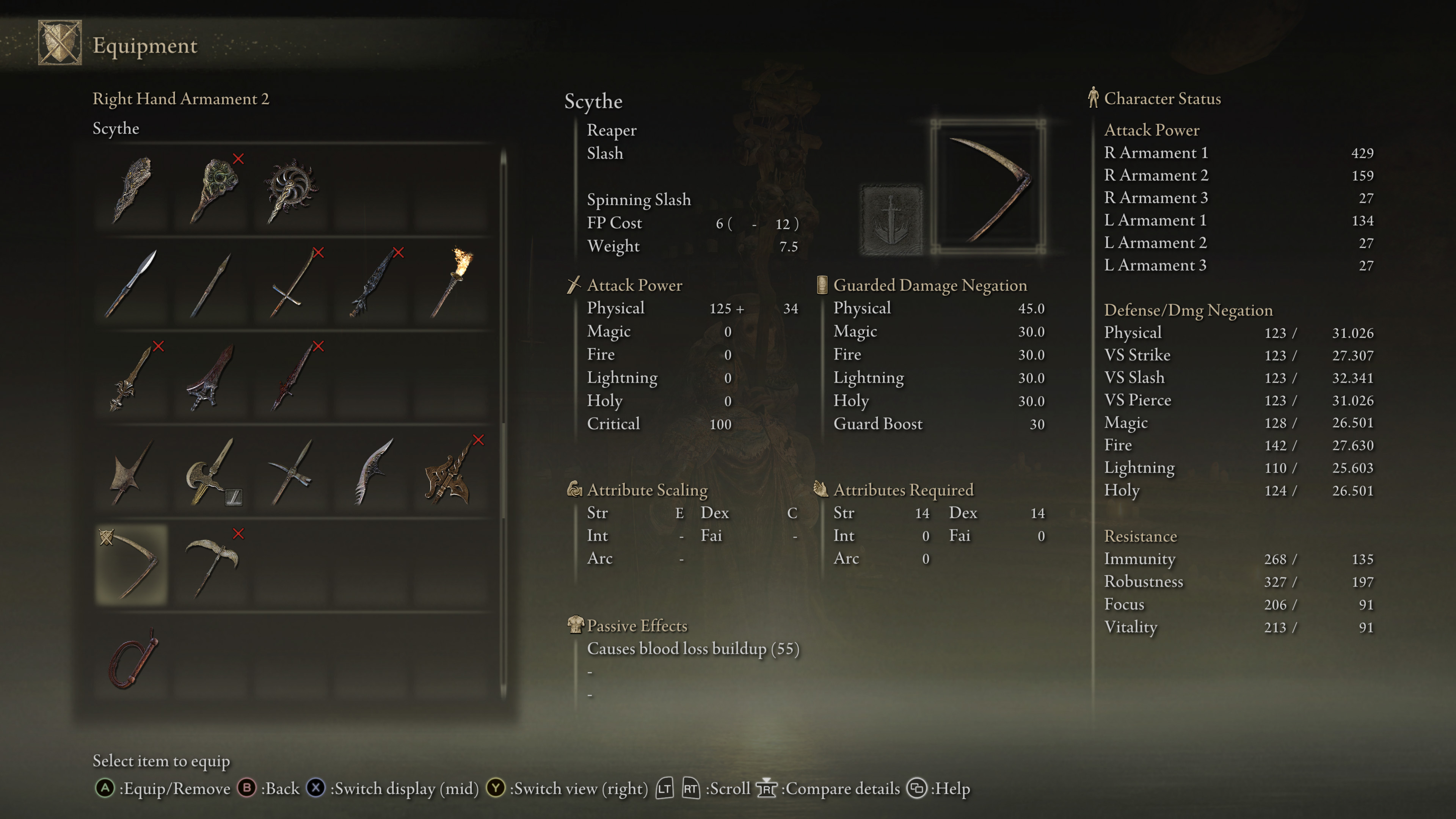
There are only four scythe-like Reaper weapons in Elden Ring, but they're definitely a type to try if you're looking to experiment with Dexterity melee weapons and bleed effects. Each Reaper weapon is large and therefore has a long reach. Combined with a moveset that involves sweeping Slash attacks instead of aimed thrusts, and you've got a Dexterity weapon type that can easily hit several targets at once. Each Reaper weapon also has a good blood loss passive effect, allowing them to deal even more damage after successive hits.
Whips
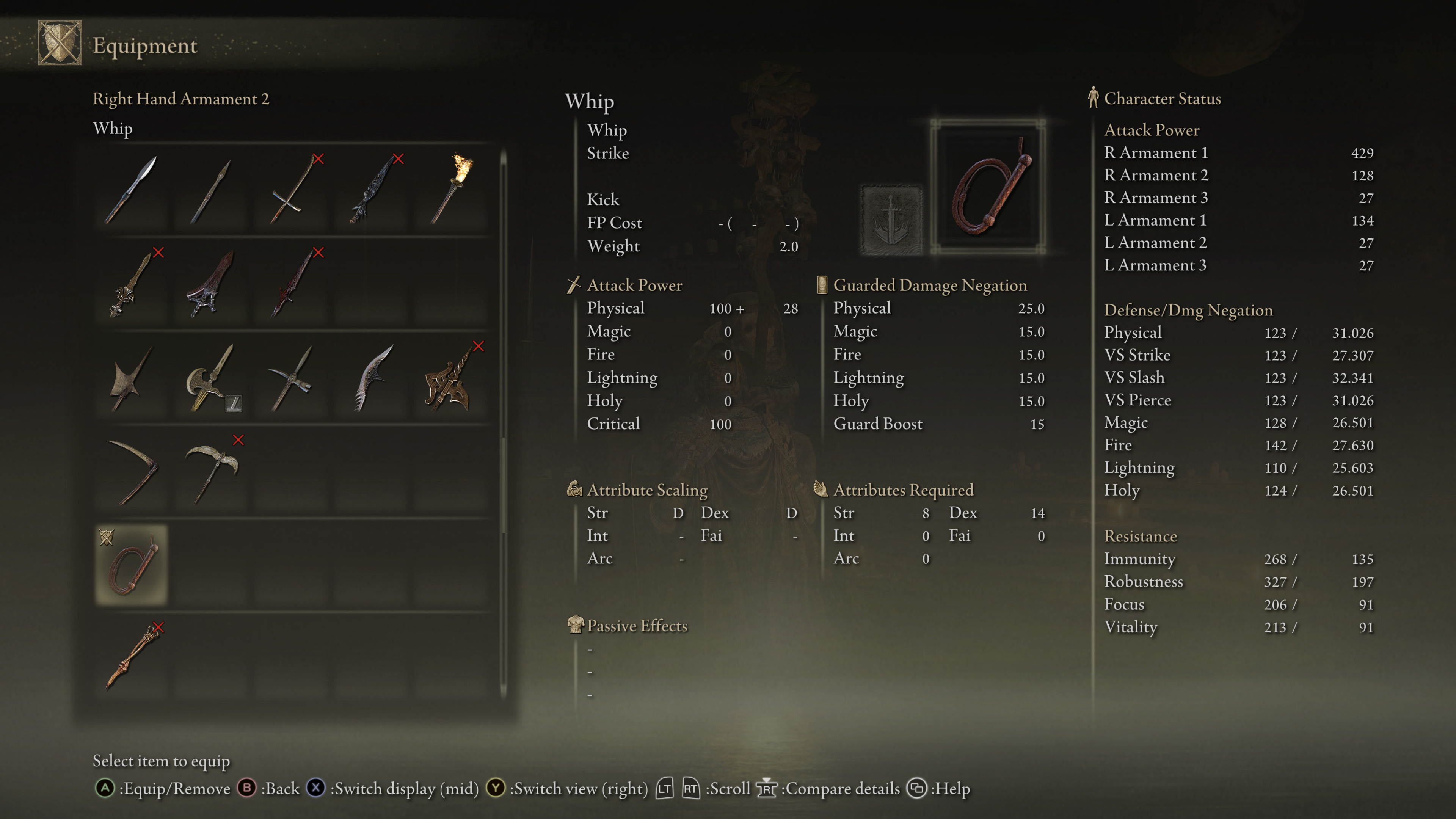
Whips are a very specialized weapon type in Elden Ring and don't seem to be that effective, although someone out there probably has a really good Whip build. They don't deal much damage and can't perform critical hits, but do have really good range for a melee weapon and cannot be parried. The Thorned Whip and Hoslow's Petal Whip are able to cause blood loss and inflict bleed damage, so successive hits to proc bleeding can make these particular Whips quite useful.
Fists and Claws
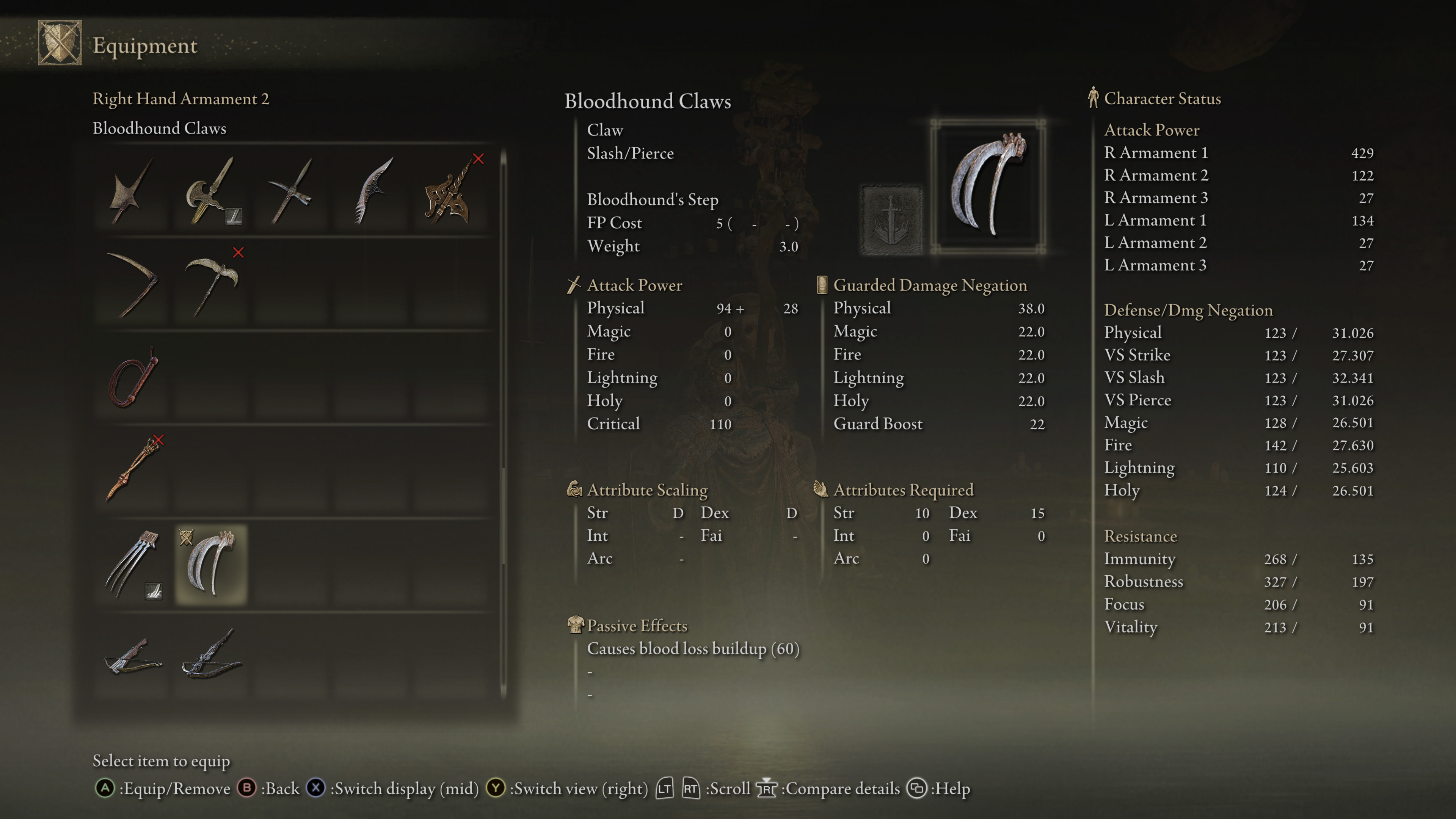
These two weapon types are incredibly similar so we've grouped them together. Both weapon types are equipped on both hands and excel in extremely close-range combat - good for enthusiasts of Wolverine from X-Men. Claws are mainly focus on Dexterity damage scaling and all Claw weapons come with a good blood loss effect that can lead to high bleed damage on enemies. Fist weapons are a bit more varied and have more balanced damage scaling. The weapons can vary from the Clinging Bone, which has the LIfesteal Fist skill to leech HP from human enemies, to the Iron Ball, which is literally just a ball of iron that you can beat enemies with.
Bows
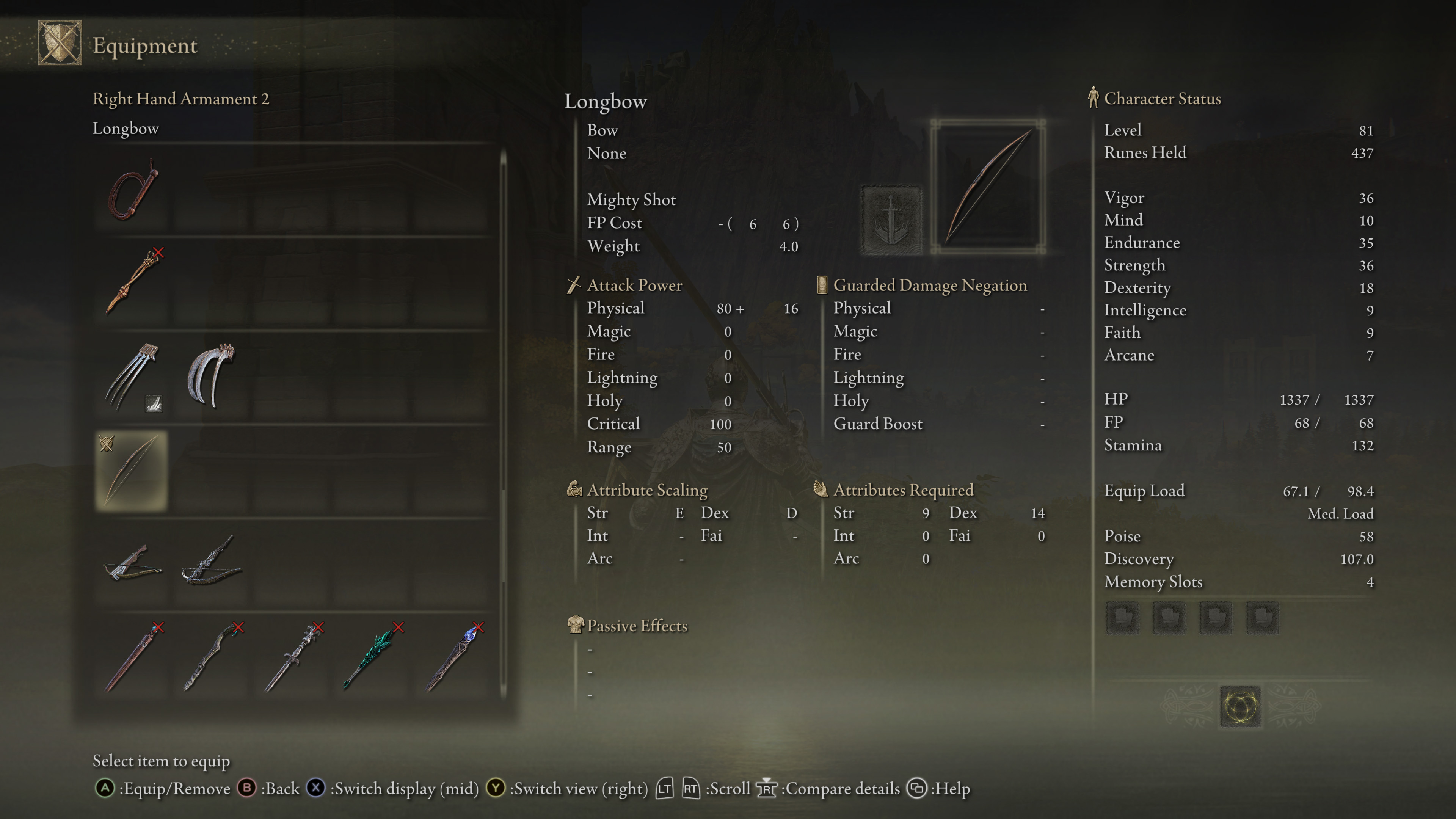
Bows in Elden Ring behave very similarly to bows in previous FromSoftware titles. That is to say they are Dexterity-based weapons with high range and solid physical damage. However, they can also be equipped with a range of Ashes of War to add skills that fire special empowered arrows, dealing even more damage. You can also find and craft lots of different arrow types to deal more than just physical damage. If you want a bow from the start, the Samurai class has the Longbow as one of its starting weapons.
Crossbows and Ballistas
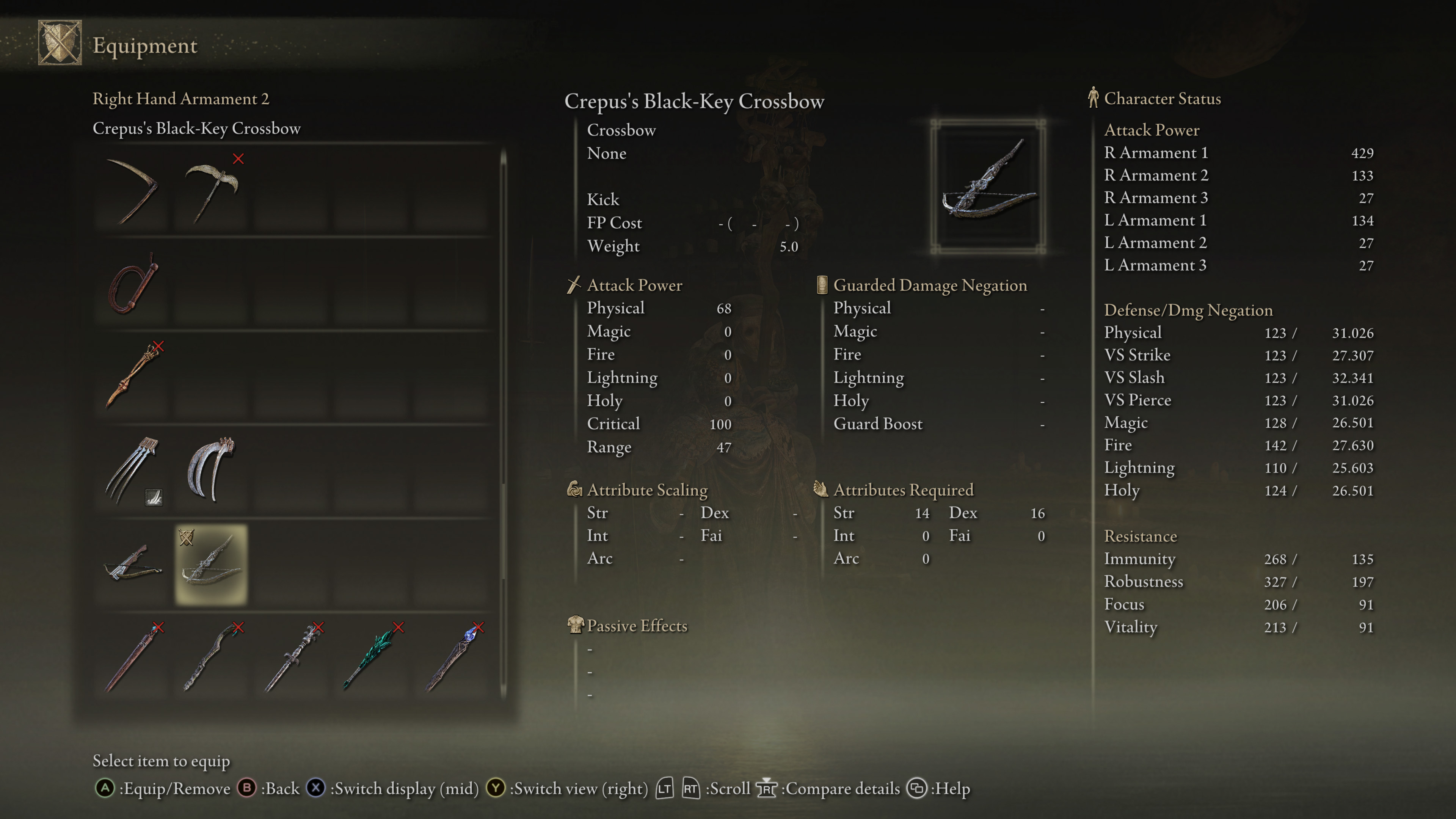
Elden Ring crossbows are a much weaker but more general-purpose version of bows. They lack fine aiming, damage scaling, and range compared to bows, but their bolt ammunition is relatively abundant and they're very easy to use. Crossbows deal lower overall damage, but they're always useful to have, particularly for melee-focused builds with very limited range options. The lack of damage scaling and reasonably low Attribute requirements means you won't have to spend Runes levelling up any stats to be effective with the crossbow.
Similarly, Ballistas are the heavy counterpart to crossbows. It's a ranged weapon type in Elden Ring that also has no damage scaling and deals high physical damage with each shot.
Glintstone Staves
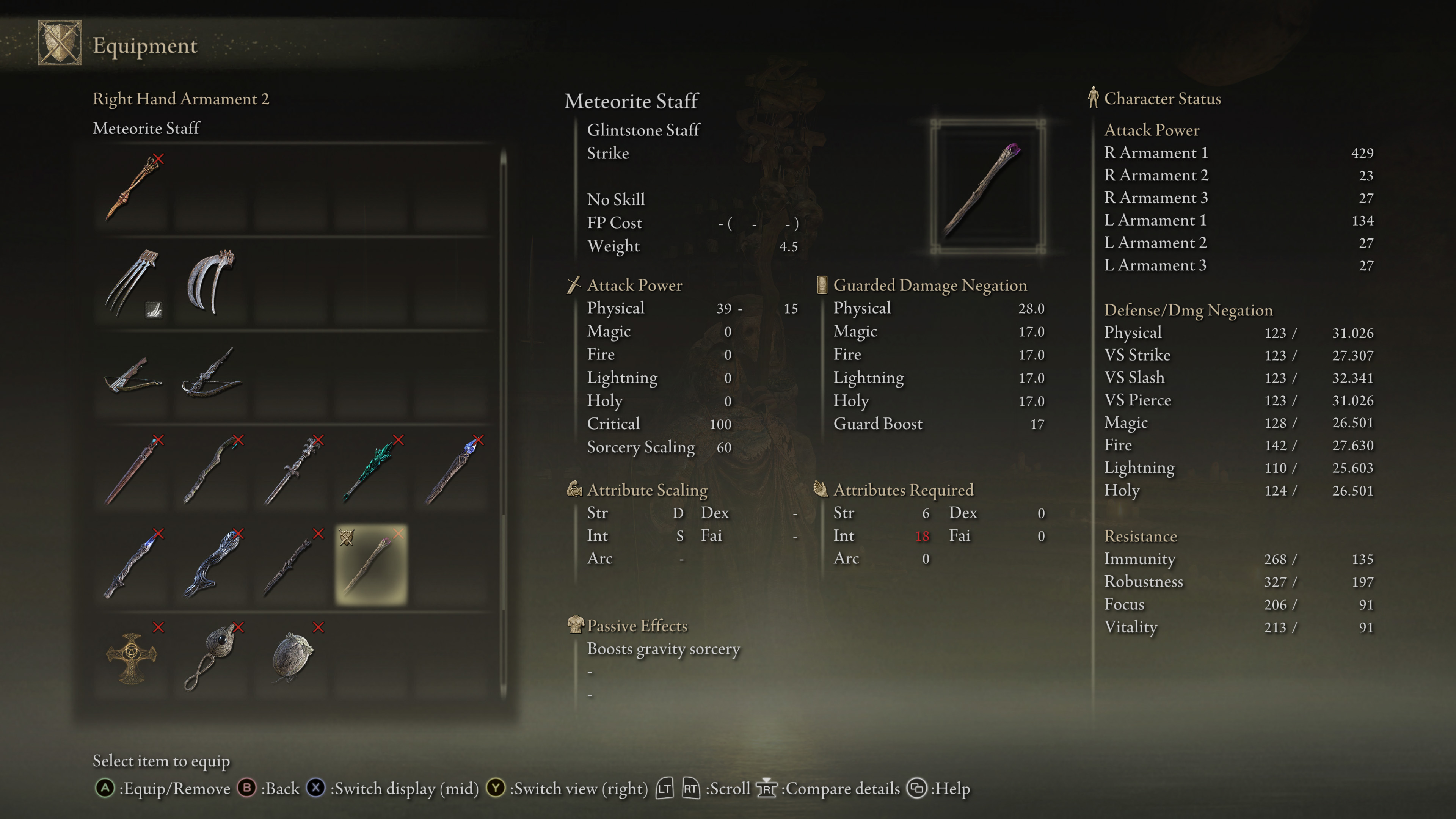
These are basically magic wands in Elden Ring, used to cast Intelligence-based Sorceries. While staffs deal a very weak amount of Strike damage, they have very high Intelligence scaling for spells, and often come with passive effects that boost particular types of sorcery. As a magic weapons, they can't be altered by Ashes of War, with changes instead made by choosing different spells to cast. One of the best staffs to get is the Elden Ring Meteorite Staff, which boosts gravity sorceries and has is S-rated in Intelligence scaling.
Sacred Seals
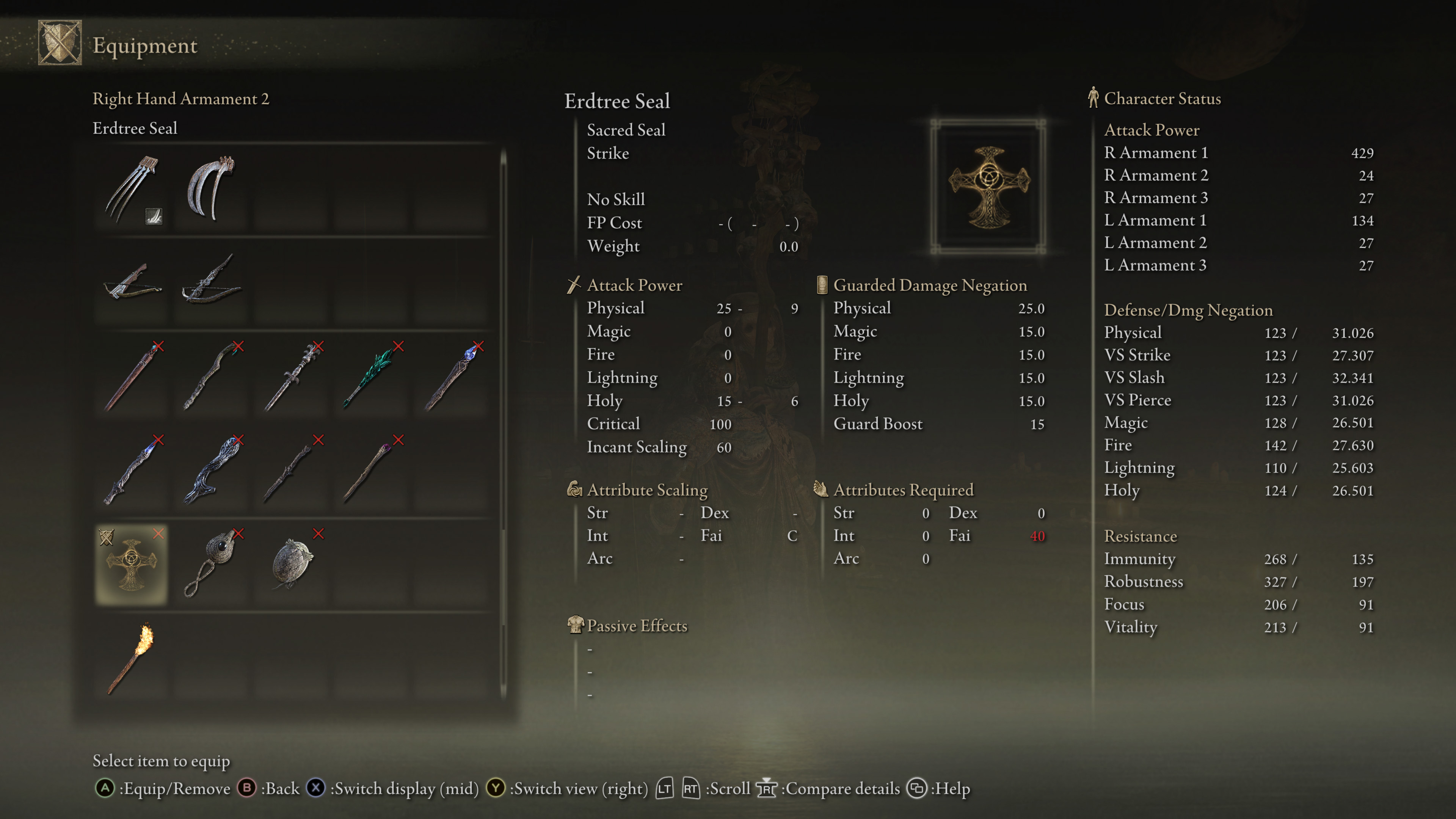
Seals are on the other end of the magical scale to Glintstone Staffs in Elden Ring. They are a type of Faith-based weapon and are used to cast incantations, which means any boosts to your Faith stat enhance your Sacred Seal and any incantations you cast with it. Such spells include offensive options, with some fire-based spells for example, but also a lot of status based effects to heal and clear effects like poison.S
Shields
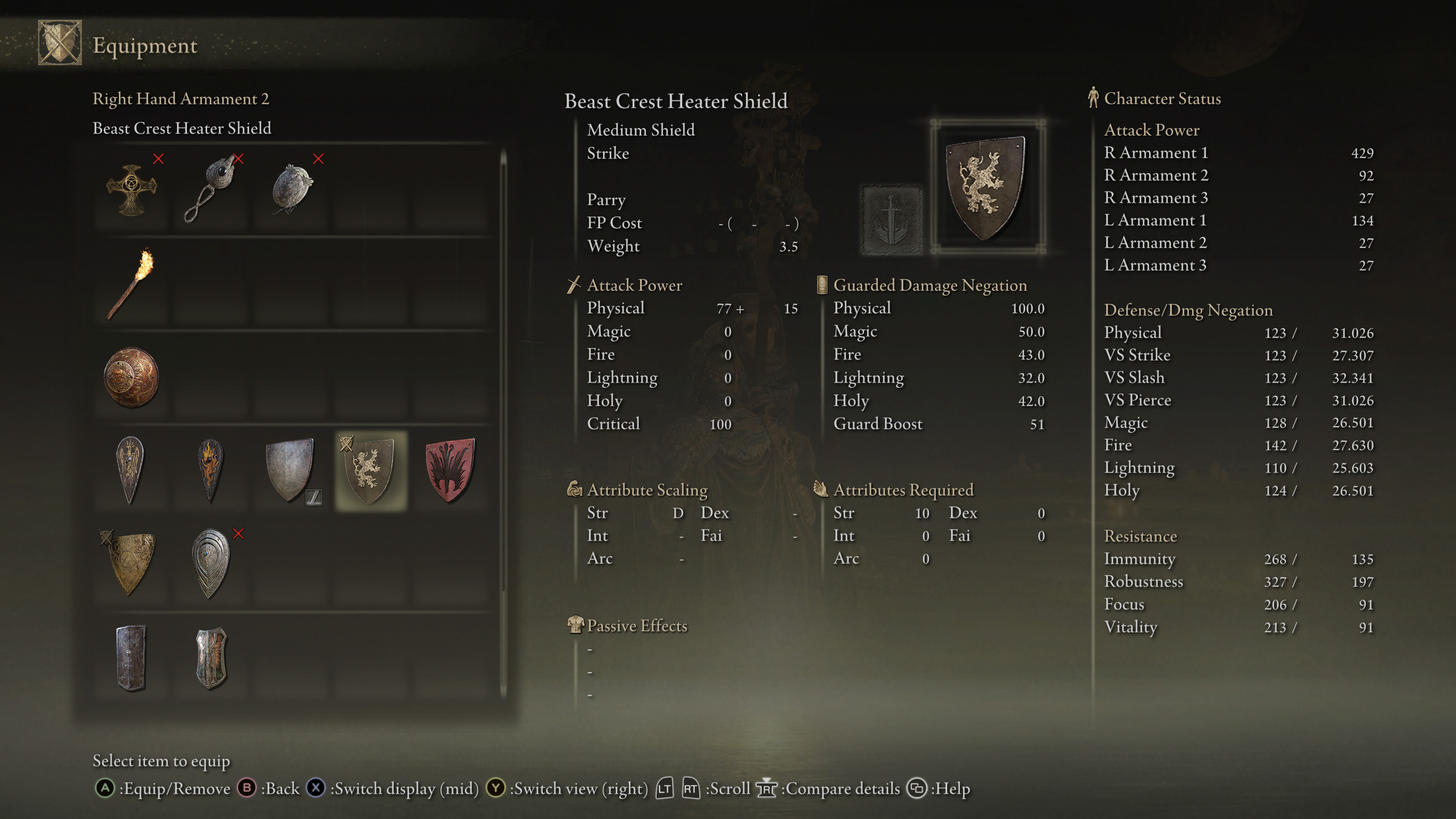
Shields can in fact be used offensively in Elden Ring, although we wouldn't recommend it. They come in three flavors - small, medium, and great - and each one offers varying levels of damage negation and weight. Small shields are obviously light and have a very quick parrying animation, but they also have have the poorest damage negation. Greatshields offer superb damage negation and guard boosting, but are too unwieldy for parrying. However, their size does mean that they do moderate damage and can be equipped with other Ashes of War. Medium Shields are a nice balance of the two with solid damage negation and the ability to parry, although it's trickier to pull off compared to a small shield.
If you're going for a parry build, the Buckler Shield is the best option and the Bandit class starts with this shield. For a more balanced shield, look out for the Brass Shield that has a chance of dropping from the armored soldier enemies from around the Lands Between. Remember, Smithing Stones do not improve a shield's protective abilities and only its damage, so don't waste stones if you aren't using your shield as a weapon.
Elden Ring armor locations | Elden Ring best builds | Elden Ring best spells | Elden Ring weapon scaling explained | How to strengthen weapons in Elden Ring | How to get the Elden Ring Golden Scarab | Elden Ring Stonesword Keys | Elden Ring Sacred Relic Sword
© GamesRadar+. Not to be reproduced without permission
Weekly digests, tales from the communities you love, and more

I'm GamesRadar's Managing Editor for guides, which means I run GamesRadar's guides and tips content. I also write reviews, previews and features, largely about horror, action adventure, FPS and open world games. I previously worked on Kotaku, and the Official PlayStation Magazine and website.
- Will SawyerGuides Writer
- Joel FraneyGuides Writer


